Fables and Tales
![]()
|
|
| |
Back to Index Page |
Fables and Tales , Book I![]()
Fables and Tales is a compilation of 101 short stories with a message for the transformation of human consciousness towards the Light. It teaches by example, by using metaphors, as Divine Jesus taught his people. We follow His Way.
Research and compilation made by Luis Prada, Editor and Publisher of Brother Veritus’ Website. This is a labor of love done with deep passion and love for humanity and to contribute to human enlightenment.
This book is also available in Spanish, seeCuentos y Fábulas, Primer Libro, inBrother Veritus’ Website-Español. See alsoFables and Tales, Book II, in this Section.
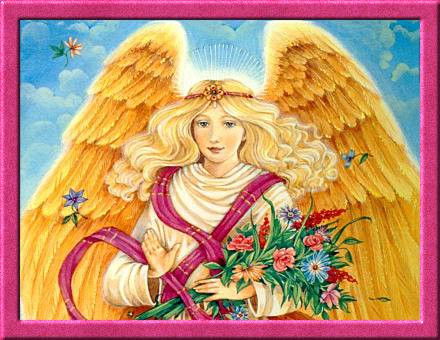
This eBook in the form of a webpage has 101 short stories for children of all ages. This will be a good start for your child into the realm of spirituality.
(Between you and me: I have never grown up, that’s why I enjoy this collection so much! Beside, should I have really the mind of an adult instead of a child’s I would not have created this Website, since it is too time consuming to produce it and does not generate a monetary profit. I am playing, really.)
All translations to English by Luis Prada.
![]()
![]() How Do You Know?
How Do You Know?
Unknown Author
(Original text in Spanish, Translation)![]()
Many years ago, in a poor Chinese village, lived a peasant with his son.His only material good, besides the land and his little straw hut, was a horse he had inherited from his father. One good day the horse run away leaving the man without a horse to till the land. His neighbors —who respected him for his honesty and diligence— came to his home to let him know how much they regretted what happened. He thanked the visit, but asked:
—How would you know that what happened has been a misfortune in my life?
Somebody commented in a low voice to a friend:
«He doesn’t want to accept reality, let him think what he wants, as long as he doesn’t get sad with what has happened».
And the neighbors went away, feigning to be in agreement with what they had heard.
A week later, his horse came back to the stable, but he was not alone: He brought with him a beautiful mare as company. After knowing this the inhabitants of the village overjoyed, because only now they understood the answer the man had given them, returned to the peasant’s home to congratulate him for his good luck.
—Before you had just one horse, now you have two. Congratulations!—they said.
—Thank you very much for your visit and your solidarity —answered the peasant. But, how do you know that what happened to me is a blessing in my life?
Confused, and thinking the man was turning insane, the neighbors walked away, commenting on the road:
«Is it possible that this man does not understand that God sent him a gift?»
A month had passed, the peasant’s son decided to tame the mare. But the animal jumped in an unexpected way, and the boy had a bad fall breaking a leg.The neighbors came back to the peasant’s home taking with them presents for the wounded youth. The major of town, solemnly, presented his condolences to the father saying that all were very sad for what had happened. The man thanked the visit and everybody’s affection. But he asked:
—How can you know if what happened has been a misfortune in my life?
This sentence left everybody astonished, since nobody could have the least doubt that an accident of his son is a true tragedy. When leaving the peasant’s home they commented among themselves:
«Really he is becoming crazy; his only son may end up lame forever and he still has doubts that what has happened is a tragedy».
Some months passed and Japan declared war to China. The emissaries went through the country looking for healthy boys to be sent to the battle front. When arrived to the villagedrafted all the young ones except the peasant’s son who was with his broken leg. None of the boys returned alive. His son recovered, the two animals gave a litter that was sold and gave good money. The peasant went to visit his neighbors to console them and help them, since they had shown solidarity with him at all times. Always when any of them complained the peasant said:
—How do you know if this is a tragedy? If somebody was too happy, he asked:
—How do you know if that is a blessing?
And the men of that village understood that, beyond appearances, life has other meanings.
Back
![]()
![]() Tale of the Strawberry
Tale of the Strawberry
(Original text in Spanish, Translation)
Jorge Bucay![]()
A king went to his garden and discovered that his trees, bushes and flowers were dying. The Oak told him that was dying because it could not be as tall as the Pine. Turning to the Pine, found it fallen because could not give grapes as the Vine. And the Vine was dying because could not blossom as the Rose. The Rose cried because could not be as tall and solid as the Oak.
Then he found a plant, a Strawberry, blossoming and fresher than ever. The king asked it:
—How do you grow so healthy in the mist of this withered and somber garden?
—I do not know.Perhaps it be because always I supposed that when you planted me, you wanted strawberries. If you would have wanted an Oak or a Rose, you had planted them. At that time I said to myself:"I will try to be Strawberry the best way I can."
Now it is your turn. You are here to contribute with our fragrance. Simply look at yourself. There are no possibilities you be another person. You could enjoy it and blossom with your own love for you, or you could wither in your own sentence…
Back
![]()
![]() The Cracked Water Pot
The Cracked Water Pot
Unknown Author
A water bearer in India had two large pots, each hung on each endof a polewhich he carried across his neck.One of the pots had a crack in it, andwhile the other potwas perfect and always delivered a full portion of waterat the end of the long walk from the stream to the master’shouse, thecracked pot arrived only half full.For a full two years this went on daily, with the bearerdelivering only one and a half pots full of water in hismaster’s house. Of course, the perfect pot was proud of itsaccomplishments,perfect to the end for which it was made.But the poor cracked pot wasashamed of its own imperfection,and miserable that it was able to accomplish only half of what it had been made to do.
After two years of whatit perceived to be a bitter failure, it spoketothewater bearer one day by the stream."I am ashamed of myself, and I want to apologize to you.""Why?," asked the bearer. "What are you ashamed of?""I have been able, for these past two years, to deliver only halfmy load because thiscrack in my side causes water to leak outall the way back to your master’s house. Because of my flawsyou have to do all of this work and you don’t getfull valuefrom your efforts," the pot said. The water bearer felt sorry for the old cracked pot, and inhis compassion he said, "As we return to themaster’s house, I want you to notice the beautiful flowers along the path."
Indeed, as they went up the hill the old cracked pot tooknotice of thesun warming the beautiful wild flowers on theside of the path, and this cheered it some. But at the end ofthe trail, it still felt bad because it had leaked outhalf itsload,and so again it apologized to the bearer for its failure.The bearer said to the pot, "Did you notice that there wereflowers only onyour side of your path, but not on the otherpot’s side? That’s because I have always known about your flaw,and I took advantage of it.Iplanted flower seeds on your side of the path, and every daywhilewewalkback from the stream, you’ve watered them.For two years I havebeen able to pick these beautiful flowersto decorate my master’s table. Without you being just the wayyou are, he would not have this beauty to gracehis house."
Moral: Each of us has our own unique flaws. We’re all cracked pots. But it’s the cracks and flaws we each have that make our livestogetherso very interesting and rewarding. You’ve just got to take eachpersonfor whatthey are, and look for the good in them. There is a lot of good out there. There is a lot of good in us! Blessed are the flexible, for theyshall not be bent out of shape. Rememberto appreciate all the different people in your life! Or as we like to think of it——if it hadn’t been for thecrackpotsinour lives it would have been prettyboring and not sointeresting…Thank you, all crackpot friends.
Back
![]()
![]() The Old Ceramic Pot
The Old Ceramic Pot
Unknown Author
(Original text in Spanish, Translation)
On one occasion the Master told the story of an old ceramic pot of inestimable price for which he had paid a fortune at a public auction. The pot had been used for many years by a beggar who ended up his life in misery, totally ignorant of the value of that object with which he had begged.
When the disciple asked the Master what that vessel represented, the Master told him: "Yourself".
The disciple asked him for an explanation, and the Master proceeded: "You center all your attention in the insignificant knowledge that you acquire through books and from the masters. It would be better that you focus your attention on the vessel in which you keep it."
Back
![]()
![]() The Hermitage
The Hermitage
Unknown Author
(Original text in Spanish, Translation)![]()
![]()
![]()
![]()
The old man Haakon took care of a certain Hermitage. In it it was venerated a Crucifix of great devotion. This Crucifix had the name, well significant, of "Christ of the Favors". All came there to ask the Holy Christ. One day the hermit Haakon wanted to ask him a favor. He was compelled by a generous feeling. He knelt down before the image and said:
—"Lord, I want to suffer for you. Let me occupy your place. I want to replace thee at The Cross." And stayed put with fixed gaze at the Sacred Effigy, as in waiting for an answer. The Crucified opened his lips and spoke. His words felt from up high, whispering and admonishing:
—"Servant of mine, I accede to your wish, but it has to be with one condition."
—"Which one, Lord?", asked Haakon with supplicant accent.
—"It is a difficult condition", said the Lord.
—"I am willing to fulfill it with your help, Lord", answered the old hermit.
—"Listen: happens what happens and see what you see, you have to keep always silent". Haakon answered:
—"I promise it, Lord".And the change was done. Nobody noticed the exchange. Nobody recognized the hermit, hanging from four nails on the Cross.
The Lord occupied the place of Haakon. And this for long time fulfilled the obligation. He said nothing to anybody. The devout continued filing up asking for favors. But one day came a rich man, after having prayed, left forgotten his wallet there. Haakon saw it and kept silent.Nor even said anything when a poor, that came two hours later, took the wallet of the rich one. Neither said anything when a boy knelt down before him just after that to ask his grace before starting a long trip. But at that moment the rich entered looking for his bag. Not finding it, thought that the boy had taken it. The rich turned to the youth and irascible said:
—"Give me my bag that you have stolen from me!".Surprised the young answered:
—"I have stolen no bag".
—"Do not lie, give it to me right away!
—"I told you that I have not taken any bag", replied the boy.
The rich furiously charged against him. Then sounded a strong voice:
—"Stop!" The rich looked up and saw that the image was speaking to him.Haakon, that could not remain silent, cried, defended the youth, rebuked the rich for the false accusation. This was astonished, and left the Hermitage. The young left too because was rushing to start his trip. When the Hermitage was alone, Christ turned to his servant and said:
—"Come down from the Cross. You do not fit my office. You have not known to keep silent".
—"Lord", said Haakon, "how I could allowed that injustice?" The offices were changed. Jesus occupied the Cross again and the hermit stayed before the Crucifix. The Lord, nailed, continued talking:
—"You did not know that was right for the rich to lose the bag since in it he carried the price of a young woman’s virginity. The poor, on the contrary, had a need of that money and did fine in taking it; with respect to the boy that was about to be hit, his wounds would had prevented him to make the trip that for him would turn fatal. Now, some minutes ago the ship has shipwrecked and he has lost his life. You knew nothing. I do know. That’s why I keep silent". . .And the sacred image of the crucified kept silent.
How many times we pretend to lead our destiny believing that it is the best for us! Only God knows what is best for us. We have to learn to accept his/her Holy Will, even though sometimes we do not comprehend it.
Back
![]()
Unknown Author
(Original text in Spanish, Translation)
Appearances are deceitful, let’s always have trust in God.
They say that once a man was chased by several wicked men who wanted to kill him. The man entered into a cave. The wicked men started looking for him in all previous caves from where he was. With great desperation he prayed to God in the following manner:
"Almighty God, make two angels come down and seal the entrance so they cannot enter and kill me". At that moment he heard the men approaching the cave in where he was, and saw a little spider appeared. The little spider started to weave a web at the entrance. The man again prayed, this time more desperately:
"Lord, I asked you for angels, not a spider." And continued: "Lord, please, with your mighty hand place a strong wall at the entrance so that the men cannot enter to kill me." He opened his eyes expecting to see a wall sealing the entrance, and observed the little spider weaving its spider web. The wicked men were already entering the previous cave from where the man was and this one was waiting for his death. When the wicked men stood in front of the cave where the man was in the little spider had already covered the whole entrance, then he heard this conversation:
First man: "Come on, let’s get in this cave." Second man: "No. Can’t you see that it even has spider webs?, nobody has entered in this one."
Faith is believing that you have what cannot see, persevering in the impossible. There is a beautiful sentence that says: "If you ask God for a tree He will give it to you in the form of a seed". We ask things that from a human perspective are what we need, but God gives us those with which He shows us that with very simple things He can do a lot much more. As in this reading sometimes we ask for walls to be sure, but it wouldn’t have any merit since we would know and we would be certain that we are protected, God on the contrary asks us for more confidence in Him to let His Glory manifest and to make that something as a spider web gives us the same protection as a wall. If you have asked for a wall and only see but a spider web, remember that God can change things… and trust in Him.
Back
![]()
Unknown Author
Taken from: http://www.thewavesight.net/shareinfo.htm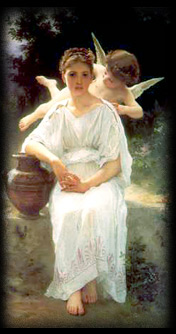
There is a difference between education and experience. Education is what you get from reading the small print. Experience is what you get from not reading it! But isn’t it true that great learning comes from both education and experience? Let me tell you a parable:
A young school teacher had a dream that an angel appeared to him and said, "You will be given a child who will grow up to become a world leader. How will you prepare her so that she will realize her intelligence, grow in confidence, develop both her assertiveness and sensitivity, be open—minded, yet strong in character? In short, what kind of education will you provide that she can become one of the world’s truly GREAT leaders?"
The young teacher awoke in a cold sweat. It had never occurred to him before —any ONE of his present or future students could be the person described in his dream. Was he preparing them to rise to ANY POSITION to which they may aspire? He thought, ‘How might my teaching change if I KNEW that one of my students were this person?’ He gradually began to formulate a plan in his mind:
-
This student would need experience as well as instruction.
-
She would need to know how to solve problems of various kinds.
-
She would need to grow in character as well as knowledge.
-
She would need self assurance as well as the ability to listen well and work with others.
-
She would need to understand and appreciate the past, yet feel optimistic about the future.
-
She would need to know the value of lifelong learning in order to keep a curious and active mind.
-
She would need to grow in understanding of others and become a student of the spirit.
-
She would need to set high standards for herself and learn self discipline, yet she would also need love and encouragement, that she might be filled with love and goodness.
His teaching changed. Every young person who walked through his classroom became, for him, a future world leader. He saw each one, not as they were, but as they could be. He expected the best from his students, yet tempered it with compassion. He taught each one as if the future of the world depended on his instruction. After many years, a woman he knew rose to a position of world prominence. He realized that she must surely have been the girl described in his dream. Only she was not one of his students, but rather his daughter. For of all the various teachers in her life, her father was the best. I’ve heard it said that "Children are living messages we send to a time and place we will never see." But this isn’t simply a parable about an unnamed school teacher. It is a parable about you and me —whether or not we are parents or even teachers. And the story, OUR story, actually begins like this:
"You will be given a child who will grow up to become…." You finish the sentence. If not a world leader, then a superb father? An excellent teacher? A gifted healer? An innovative problem solver? An inspiring artist? A generous philanthropist? Where and how you will encounter this child is a mystery. But believe that one child’s future may depend upon influence only you can provide, and something remarkable will happen. For no young person will ever be ordinary to you again. And you will never be the same.
Back

![]()
![]() How the Book Tao Te King Was Written
How the Book Tao Te King Was Written
Unknown Author
(Original text in Spanish, Translation)
How was written one of the most important books of the world? In the year twentieth third of the reign of Zhao, Lao Tse perceived that war would end up destroying the place where he lived. Because he had spent years meditating on the nature of life, he knew that in certain moments it is required to be practical. He decided, then, to take the simplest decision: move away.
He took his small belongings, and parted in the direction of Han Keou; at the city’s exit gate, he found a guard.
— Where is so important sage going to? — asked the guard — .
— Away from war.
— You cannot leave like this. I’d like very much to know what was that you learned in so many years of meditation. I will only let you part is you share with me what you know.
Just to get rid of the guard, Lao Tse wrote right there a little book, which only copy he handed to him. Then, he continued his trip, and never more was heard of him.
The text of Lao Tse was copied and recopied, crossed centuries, crossed millennia, and came down to our time. It is called Tao Te King, it is published in Portuguese by several publishing houses, and it is a obliged reading. Here goes one of its pages:
He who knows others is wise,
He who knows himself is an enlightened,
He who conquers others is strong,
He who conquers himself is powerful,
He who knows happiness is rich,
He who keeps his way has willpower.
Be humble, and will remain whole,
Bend, and will remain erect,
Empty yourself, and will remain full,
Wear yourself out, and will remain anew.
The wise does not exhibit himself, and therefore he shines,
He does not make himself noticed, and therefore he is noticed,
Does not praise himself, and therefore he has merit,
And because he is not competing, nobody in the world
can compete with him.
![]()
![]() Carpentry Assembly
Carpentry Assembly









Unknown Author
(Original text in Spanish, Translation)
It was told that at one time there was a strange assembly in a carpentry. It was a meeting of tools to fix their differences. The Hammer was named Director of Debates, but the assembly notified him that he had to resign: The cause, he was too noisy! And he was spending his time pounding. The Hammer accepted guilty, but asked that also were expulsed The Screw, he said that they had to do him make many turns to make him serve of something. Before the attack The Screw accepted too, but at the same time asked the expulsion of the Sand Paper. He made them see that she was very rough in the treatment of others and always had frictions with the other ones. And the Sand Paper agreed, on condition that were expulsed The Tape that always spend the time measuring others according to his measure, as if he were the only one perfect.
At that moment came in the carpenter, put on the apron and started his work. He used The Hammer, The Sand Paper, The Tape, and The Screw. Finally, the initial rustic wood was transformed into a pretty furniture.
When the carpentry was again alone, the assembly restarted its deliberation, it was then when The Saw took the floor and said: Gentlemen, it was demonstrated that we have defects, but the carpenter works with our qualities. That makes us valuable. So let’s stop thinking on our bad points and let’s concentrate in the usefulness of our good points. The assembly then found that The Hammer was strong, The Screws joint and gave reinforcement, The Sand Paper was special to polish and file down roughness and observed that The Tape was precise and exact.
Back
![]()
![]() The Automobile
The Automobile

Unknown Author
(Original text in Spanish, Translation)
Once upon a time there was a young lad that was near graduation from his studies. For many months he admired a beautiful sport car in an car dealer store.
Knowing that his father could buy it he told him that that car was all he wanted, so, when graduation day approached, the youth waited for some signal that his father would have bought the car. Finally in the morning of graduation day his father called him to his bedroom. He told him how proud he felt of having a son so good and how much he loved him. His father had in his hands a beautiful gift box. Curious and somehow disappointed the young boy opened the box and found a beautiful Bible of skin covers and with his name written in golden letters.
Angrily he shouted at his father saying:— With all the money you have and the only thing you give me is this Bible?
He left home to not return anymore. Many years passed and the youth turned into a successful businessman. He had a beautiful house and a wonderful family, but when he knew that his father, already an old man, was very sick he thought to visiting him. He had not seeing him since graduation day. Before he was able to depart to see him he received a telegram where it said that his father had died, and had left him as the heir of all his possessions for what it was urgently needed that he would go to his father’s home to arrange all the requirements immediately.
When he arrived a sadness and repentance filled his heart. Soon he started seeing all the important documents that his father had and found the Bible that in that occasion his father had given to him.
With tears he opened it and started to turn the pages. His father carefully had underlined a verse in Matthew 7:11: "If ye then, being evil, know how to give good gifts unto your children, how much more shall your Father which is in Heaven give good things to them that ask him." While he read those words a set of car keys fell from the Bible. They had a card from the car dealer store where he had seen that sport automobile that had desired so much. On that card was the date of the day of his graduation and the words: "PAID IN FULL."
How many times we have rejected or lost the opportunity of enjoying or live something because it does not come wrapped in beautiful packages as we expected?
Back
![]()
Unknown Author
Once upon a time the colors of the world started to quarrel. All claimed that they were the best, the most important, the most useful, and the favorite.
Greensaid, "Clearly I am the most important. I am the sign of life and of hope. I was chosen for grass, trees and leaves. Without me, all animals would die. Look over the countryside and you will see that I am in the majority."
Blueinterrupted, "You only think about the earth, but consider the sky and the sea. It is the water that is the basis of life and drawn up by the clouds from the deep sea. The sky gives space and peace and serenity, without my peace you would all be nothing."
Yellowchuckled, "You are all so serious. I bring laughter, gaiety, and warmth into the world. The sun is yellow, the moon is yellow, the stars are yellow. Every time you look at a sunflower the whole world starts to smile. Without me there would be no fun."
Orangestarted next to blow her trumpet. "I am the color of health and strength. I may be scarce, but I am precious for I serve the needs of human life. I carry the most important vitamins. Think of carrots, pumpkins, oranges, mangoes, and papayas. I don’t hang around all the time, but when I fill the sky at sunrise or sunset, my beauty is so striking that no one gives another thought to any of you."
Redcould stand it no longer, he shouted out, "I am the ruler of all of you! I am blood — life’s blood! I am the color of bravery. I am willing to fight for a cause. I bring fire into the blood. Without me, the earth would be as empty as the moon. I am the color of passion and of love, the red rose, the poinsettia and the poppy."
Purplerose up to his full height. He was very tall and spoke with great pomp. "I am the color of royalty and power. Kings, chiefs, and bishops have always chosen me, for I am the sign of authority and wisdom. People do not question me! They listen and obey."

And so the colors went on boasting, each convinced of his or her own superiority. Their quarreling became louder and louder. Suddenly there was a startling flash of bright lightening, thunder rolled and boomed.
Rain started to pour down relentlessly. The colors crouched down in fear, drawing close to one another for comfort. In the midst of the clamor, rain began to speak:
"You foolish colors, fighting amongst yourselves, each trying to dominate the rest. Don’t you know that you were each made for a special purpose, unique and different? Join hands with one another and come to me." Doing as they were told the colors united and joined hands. The rain continued: "From now on, when it rains, each of you will stretch across the sky in a great bow of color as a reminder that you can all live in peace. The Rainbow is a sign of hope for tomorrow."
And so, whenever a good rain washes the world, and a rainbow appears in the sky, let us remember to appreciate one another. [Translation of the kids’ card at the right: "Peace in the World"]
Back
![]()
Unknown Author
(Original text in Spanish, Translation)
"Love is like a little box, where it is put in and it is taken out … When love is given, it is taken from our little box and it is put in the little box of another. When love is received, it is taken from the little box of another and put into our own."
I believe that one was the best explanation that I received about loveuntil today … If it is only received and not given, the little box gets full and nobody gives you love. If it only given, it comes a time when yours is depleted. That is why in life it is important to give and to receive love. Not always the one who receives from us is the one who gives us. Nor we always give to him/her whom we receive from. But always we should be doing changes and recycling our stock of love.
Do not let your little box get empty, nor let your little box get full. Know to give and to receive. Place love in everything you do, from the moment you stand up until to lay down, at work, in the traffic, at home … The things, the details done with love have other flavor, both for the one who make them as well as for the one who receives them. Place love in your smile in the morning. Place love in the Good Day. Place love in the details of the day. Place love in the little things, and in the great ones too. And you will see that your life will be filled with fulfillments, successes, joys, good things and love. Remember that happiness only depends on us and live better!!!
Back
![]()
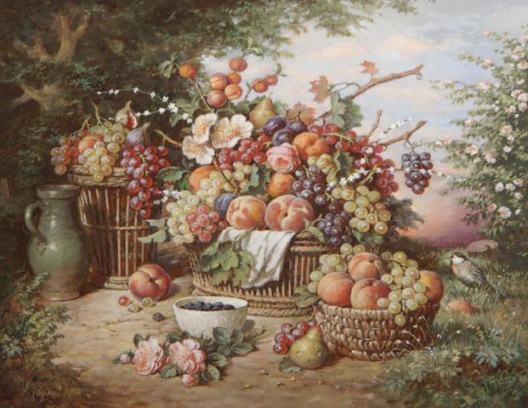
Unknown Author
(Original text in Spanish, Translation)
There were once a group of three lost men in the mountain and they only had a fruit to feed all of three, who were almost fainting from starvation. Then God appeared to them and told them would test their wisdom and depending on what they would show would save them. So God asked them what may they ask Him to fix that problem and get everybody fed.
The first one said: "Then make appear more food", God answered that it was an answer with no wisdom, since you should not ask God that magically make appear the solution to problems without working with what we have.
The second one said then: "So make the fruit grow to make it enough", to which God answered no, since the solution is not to ask always the multiplication of what we have to fix the problem, since the human being can never be satisfied and therefore it would never be enough.
The third one then said: "My good God, even though we are hungry and we are proud, make us small ourselves so the fruit would be enough". God said: "You have answered right, since when man makes himself humble and small before my eyes, he will see prosperity".
Know that it is always taught that somebody else fix the problems or to look for the easy way out, always asking God to fix everything without us changing or sacrificing anything. That is why so many times it seems God does not listen to us since we ask without letting anything be left aside and always wanting to win. Many times we are selfish and want always everything for us.
We will be happy the day when we learn that the way to ask God is by seeing ourselves as weak, and by being humble leaving our pride aside. And we will see that by making us small in luxuries and by being tame at heart we will see prosperity from God and see the way how He does listen.
Ask God to makes you small… Try it!!!!
Back
![]()
Anthony de Mello, Translation from a Spanish translation of the English original
… I propose to your consideration the following parable of life: a bus loaded with tourists traverses a beautiful region full of lakes, mountains, rivers and prairies. But the curtains of the bus are closed, and the tourists, who do not have the least idea of what lies on the other side of the windows, spend the trip discussing over who should occupy the best seat on the bus, whom they should applaud to, who is the worthiest of consideration… And so they continue until the end of trip.
Back
![]()
Unknown Author
(Original text in Spanish, Translation)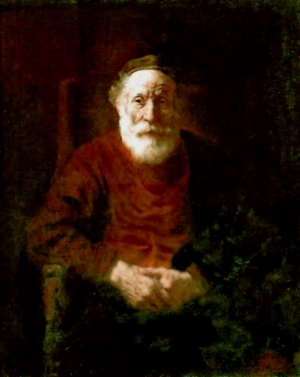
A popular story of the Middle East tells that a youth arrived at an oasis shore next to a town and approaching an old man asked:
—What kind of a people lives in this place?
—What kind of a people lives in the place where you are coming from?, asked instead the old man.
—Oh, a group of selfish and wicked, replied the young one, I am happy I have left there. To what the old man answered:
—Same you will find here.
That same day another young man approached the oasis to drink water and seeing the old man, asked:
—What kind of people lives in this place? The old man answered with the same question:
—What kind of people lives in the place you are coming from?
—A magnificent group of people, honest, amicable, hospitable, it hurts very much to have left them.
—Same you will find here, answered the old man.
A man who had heard both conversations asked the old man:
—How is it possible to give two different answers to the same question?To which the old man answered:
—Each one carries in his heart the environment where he lives. That one that did not find anything new in the places where he stayed cannot find other thing here. The one that found only friends there, can find also friends here, because, to tell the truth, your mental attitude is the only thing in your life over which you can maintain absolute control.
When you always have a positive attitude you will find the true richness in life. If you look within you will know that you possess a great strength to give and to find all the good things in others. May you always find an oasis of peace!
Back
![]()
Mónica Barbagallo, from herlibro: The Path to Your Solar Angel (El Camino Hacia Tu Ángel Solar), Volume II©
(Original text in Spanish, Translation)
![]()
![]()
Gonzalo Gallo–González, Oasis For A Better Living (Oasis Para Vivir Más y Mejor)
(Original text in Spanish, Translation)

In the last century a tourist visited the famous polish rabbi Hofetz Chaim. He was astonished to see that the rabbi’s house consisted simply of a room crammed with books. The only furniture was a table and a bench.
Detachment is a quality of those that know we are here passing by and who are free without clinging to things. If you appreciate more the inner riches that the exterior ones you live simply and live deeply. We are pilgrims. We advance much more when we walk light ofluggage.
Back
![]()
Oriental Jewish Tale
(Original text in Spanish, Translation)

When Noah was planting a vineyard, Satan appeared to him and asked permission to help him.
Satan brought first a lamb, killed it and poured its blood over the furrows. Then he soaked the earth with lion’s blood. Following he trapped a monkey and used his blood in the same way. And finally it was the turn of a pig. Then Satan explained to Noah his intentions:
When man would drink the first cup of wine he will turn sweet and happy as the lamb. With the second cup, he will be valiant and fighter as the lion, bragging of his power. Then after the third cup, he will become ridicule as the monkey. But if he drinks four or more cups he will become a repugnant pig, dirty and bestial, capable of wallowing in mud.
Back
![]()
Unknown Author
(Original text in Spanish, Translation)
On certain occasion a reporter asked a farmer if he could reveal the secret of his corn, which won the contest of the best product, year after year. The farmer confessed that it was due to the fact that he shared his seed with his neighbors.
—"Why do you share your best corn seed with your neighbors, if you also enter to the same contest year after year?” asked the reporter.
—"You will see, Sir," said the farmer. "The wind carries the pollen of the ripe maize, from one crop to the other. If my neighbors cultivate an inferior quality corn, the crossed pollination would constantly degrade the quality of mine. If I am going to sow good corn I should help my neighbor to do it so too."
The same is with other situations in our lives. Those who want to be successful should help their neighbors to be successful too. Those who decide to live well, should help others to live well, because the value of life is measured by the lives it touches. And those who opt to be happy should help others to find happiness, because the welfare of each one is found tied to the welfare of all.
May God bestow upon you the grace of success in your lives sharing what God gives you.
Back
![]()
Unknown Author
(Original text in Spanish, Translation)
— When you look at your friends strive to see yourself in them, said the master to his disciple.
— But, is that not a selfish attitude? questioned the disciple. If we worry for ourselves we never see what good others have to offer.
— Perhaps always we would get to see the good things that are around us —answered the master— but, verily, when we look at a fellowman we only looking for defects. We try to find something evil, because we wish he be worst than us. We never forgive him if he hurts us because we believe he would never forgive us. We manage to hurt him with harsh words affirming we are telling the truth, when barely we are trying to hide it from ourselves. We feign we are important so nobody can see our frailty. That is why every time you are judging your bother be aware you are the one at the tribunal.
Back
![]()
Unknown Author
(Original text in Spanish, Translation)
The disciple said to the master:
— I have spent a great deal of my life seeing things that I should not, wishing for things I should not wish for, making plans I should not be doing.
The master invited the disciple to go for a walk. On the path he pointed out to a plant and asked the disciple if he knew what that was.
— Belladonna. It can kill someone who eats its leaves.
— But it cannot kill someone who only contemplates it. In the same way the negative desires cannot cause any evil, if you do not allow yourself be seduced by them.
Back
![]()

Anthony de Mello
(This is a translation from a Spanish translation)
 The sannyasi had arrived to the outskirts of the city and encamped under a tree to spend the night. Suddenly an inhabitant running to where he was arrived and said:
The sannyasi had arrived to the outskirts of the city and encamped under a tree to spend the night. Suddenly an inhabitant running to where he was arrived and said:
— The stone! The stone! Give me the precious stone!
— What stone, asked the sannyasi.
— The other night appeared to me in a dream Lord Shiva, said the villager, and affirmed that if I would come at dusk to the outskirts of the village I would find a sannyasi that would give me a precious stone that would make me rich forever.
The sannyasi searched thoroughly his bag and took out a stone.
— Probably he referred to this one, said while giving the stone to the villager. I found it in a forest trek some days ago. Of course you can keep it.
The man was looking at the stone in awe. It was a diamond! Perhaps the biggest diamond in the world, since it was so big as the hand of a man. He took the diamond and departed.
He spend the night turning in bed, totally incapable of sleeping. Next day, at dawn, he went to see the sannyasi and said to him:
— Give me the riches that allow you to get rid of this diamond so easily.
Back
![]()
![]()
Unknown Author
(Original text in Spanish, Translation)
A woman came out of her home and saw three old men with long beards sat before her garden. She did not know them and told them:
—I do not think I know you, but you may be hungry. Please come in and eat something.
They asked:
—Is the man of the house there?
—No, she answered, he is not.
—Then we cannot enter, they said.
At dusk, when the husband arrived, she told him what happened.
—Tell them that I already arrived, invite them to come in!
The woman came out to invite the men to go into her house.
—We cannot enter a house the three together, explained the old men.
—Why?,she wanted to know.
One of the men pointed to other of his friends and explained:
—His name is Wealth. Then pointing to the other one:
—His name is Success and I am called Love. Now go in and decide with your husband which one of the three you wish to invite to your home.
The woman entered her home and told her husband what they said. The man became happy:
—How good!And since it is this way then let’s invite Wealth, so that he enters and fills our home.
His wife disagreed:
—Dear, why don’t we invite Success?
The couple’s daughter was listening from the other corner of the house and came running:
—Wouldn’t it be better to invite Love? Our home would then be full of love.
—Let’s take our daughter’s advise into account, said the husband to his wife. Go out and invite Love to be our guest.
The wife came out and asked:
—Which one of you is Love? Please come in and be our guest.
Love stood up and started to walk towards the house. The other ones stood up and followed. Surprised the lady asked to Wealth and Success:
—I invited only Love, why do you too come in?
The old men answered together:
—If you had invited Wealth or Success the other ones would have stayed outside, but since you invited Love, where he goes, we also go with him. Wherever there is love, there is also wealth and success.
*:-.,_,.-:*’“’*:-.,_,.-:*’“’*:-.,_,.-:*’“’*:-.,_,.-:*’“’*:-.,_,.-:*
MY WISH FOR YOU IS… Where there is pain, I wish for you peace and mercy. Where there is lack of faith in yourself, I wish a renewed confidence in your capacity to overcome it. Where there is fear, I wish for you love and courage.
You have two options now:
1. Erase[ignore]this, or…
2. Invite Love through this story with all people you appreciate.
I hope you choose Option 2. I did it FOR YOU.
Back
![]()
![]() Hindu Sage Reading About Jesus
Hindu Sage Reading About Jesus
Anthony de Mello, from the book "The Frog’s Prayer"
(This is a translation from a Spanish translation)

A Hindu sage was reading the Life of Jesus. When he knew how Jesus had been rejected by his own people in Nazareth, he exclaimed: "A rabbi whose congregation does not wish to cast him out of the city is not a rabbi."
And when he heard how the priests condemned Jesus to death, he sighed and said: "How difficult it is for Satan to deceive everybody…that is why he chooses outstanding ecclesiastics in different parts of the globe."
A bishop’s lament: "Wherever Jesus went, there was a revolution;wherever I go, they serve me tea."
Back
![]()
Anthony de Mello
(Text is not verbatim, translated from Spanish)

An ancient fable from India tells that there was a mouse who was always in anguish because he was afraid of the cat. A magician had compassion of him and converted him into… a cat.
But then he started to feel afraid of the dog. So the magician changed him into a dog. Then he started to feel afraid of the panther, and the magician changed him into a panther. For which he started to feel afraid of the hunter.
At this point the magician gave up and turned him back into a mouse, telling him: "Nothing of what I do for you is going to be of help to you, because you will always have the heart of a mouse."
Back
![]()
![]() Neither You Nor I Are the Same Ones
Neither You Nor I Are the Same Ones
Mónica Barbagallo
(Original text in Spanish, Translation)
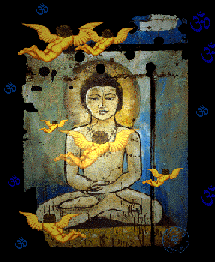 Buddha was the most awaken man of his time. Nobody as him understood human suffering and developed benevolence and compassion.
Buddha was the most awaken man of his time. Nobody as him understood human suffering and developed benevolence and compassion.
Among his cousins was the perverseDevadatta, always jealous of the master and determined to discredit him and even willing to kill him.
A certain day when Buddha was strolling peacefully, Devadatta threw a heavy rock from the top of a hill on his step with the intention of finishing with his life. However, the rock fell beside the Buddha and Devadatta could not get his objective. Buddha noticed what happened and remained impassible, without losing the smile from his lips.
Days after Buddha crossed his cousin’s path and greeted him affectionately. Quite surprised Devadatta asked:
—Aren’t you annoyed, Sir?
—No, of course not.
Without leaving his surprise, he inquired:
—Why?
And Buddha said:
—Because neither you are he who threw the rock, nor I am either he who was there when it was thrown.
The Master says: For he who knows to see, all is transitory, for he who knows to love, all is forgivable. Repeat daily: I forgive all who needs my forgiveness and I forgive myself, three times at rising time, three times at bed time —at least— and feel that you forgive from the depth of your heart.
When we forgive we act with the energy of our inner God’s Presence…and have into account that with forgiving you remove a heavy bag from you.
Back
![]()
Rabindranath Tagore, 1861-1941
(Translation from a Spanish text)
 The sun had already set in the tangle of the forest over the rivers. The children of the hermitage had come with the livestock and were sat by the fire listening to master Gautama, when an unknown child arrived and greeted him with flowers and fruits. Then, after a deep reverence, he said with bird voice:
The sun had already set in the tangle of the forest over the rivers. The children of the hermitage had come with the livestock and were sat by the fire listening to master Gautama, when an unknown child arrived and greeted him with flowers and fruits. Then, after a deep reverence, he said with bird voice:
—Lord Gautama, I come for you to guide me by the Path of Truth. My name is Satyakama
—Blessed you be –said the Master. And from which caste are you, my son? Because only a Brahmin can aspire to supreme wisdom.
The child answered:
—I don’t know which caste I am from, Master, but I am going to ask it to my mother.
Satyakama said good by, crossed the river by the narrowest part, and returned to his mother’s hut, which was at the end of the sandy land, outside of the already sleeping village. The lamp illumined weakly the door, and the mother was outside, standing in the shadow, waiting the return of her child.
She hold him against her breast, kissed his head and asked him what the Master had said.
—What is my father’s name? –said the child. Because the Lord Gautama told me that only a Brahmin can aspire to supreme wisdom.
The woman lowered her eyes and spoke sweetly:
—When young I was poor and knew many masters. I only can tell you that you came to the arms of your mother Jabala, who did not have a husband.
The first rays of the sun scorched the top of the trees of the hermitage of the forest. The children, still wet their tangled hair from the morning bath, were seating before their Master, under an old tree. Satyakama arrived,made a deep reverence to the Master and stood in silence.
—Tell me –the Master asked him.Do you know already which caste you are of?
—Lord, –said Satyakama– I do not know. My mother told me: I knew many masters when I was young, and you came to the arms of your mother Jabala, who did not have a husband.
Then a rumor raised as the irascible buzzing of the harassed bees in their honeycomb. And the students mumbled among themselves of the imprudent insolence of the child without father.
But the Master Gautamaraised, brought the child with his arms into his breast and said to him:
—You are the best of all Brahmins, my son, because you have the noblest heritage which is the truth.
Back
![]()
Unknown Author
(Original text in Spanish, Translation)
 Thewind stopped. The birds respectfully kept silent. The entire heaven appeared to stop to listen while inside the soul of the holy hermit a silent voice seemed to raise him to other worlds. Only when the Soul speaks the words live. Only when the heart is free can love be expressed. Only when the ear listens, the verb acts. Only if the eyes are put on the light can the steps be correctly directed. Only if the thought is silent, the Master speaks. Only in the absence of desires can peace flourish. Only when idols fall can the liberty torch be lit. Only by transcending the smallness of being it is arrived to the inner sanctuary. Only in the absence of personality, God reveals his plan. Only by dissolving the illusion of time and space is the spirit comprehended...
Thewind stopped. The birds respectfully kept silent. The entire heaven appeared to stop to listen while inside the soul of the holy hermit a silent voice seemed to raise him to other worlds. Only when the Soul speaks the words live. Only when the heart is free can love be expressed. Only when the ear listens, the verb acts. Only if the eyes are put on the light can the steps be correctly directed. Only if the thought is silent, the Master speaks. Only in the absence of desires can peace flourish. Only when idols fall can the liberty torch be lit. Only by transcending the smallness of being it is arrived to the inner sanctuary. Only in the absence of personality, God reveals his plan. Only by dissolving the illusion of time and space is the spirit comprehended...
… The hours passed by and the sun shined again in the horizon. And the holy old man submerged himself in the Samadhi to wake up in the kingdoms of God.
The Conversion
And he saw a sudden flash that illumined the dark night that surrounded him and his eyes did not see as before. He saw the pain of the sick and knew they needed love. That many of their illnesses are product of lack of love. He saw the face of delinquents and knew that their acts were asking for love because they seek to protest the loneliness and incomprehension they felt. He saw the anguish of the hungry and perceived the lack of love. He saw the face of the evil and cruel ones and comprehended the loneliness and fear that surrounded their hearts and understood their imperious need of love. He saw the contaminated rivers, the parched lands, the barren valleys and knew that the world was in need of love. And then he thought:"TODAY I WILL SING TO LOVE, AND MY LIFE WILL BE AN ETERNAL ARPEGGIO OF LOVE".
Back
![]()
Unknown Author
(Original text in Spanish, Translation)
Once upon a time there was a king who had four wives. He loved his fourth wife more than the others and adorned her with rich garments and pleased her with the finest gestures. He only gave her the best.
He also loved his third wife very much and always exhibit her in the neighboring kingdoms. However, he feared that someday she may run away with someone else.
He also loved his second wife. She was his confident and always showed herself kind, considerate and patient with him. Each time the king had a problem he trusted her to help him to get out of difficult times.
The king’s first wife was a very loyal companion and had made great contributions to keep both wealth and the monarch’s kingdom. However, he did not love his first wife and even though she loved him deeply, he barely put his eyes on her.
One day the king got sick and realized he had little time. He thought about his life of luxury and pondered: "Now I have four wives with me, when I die I’ll be alone." So he asked his fourth wife: "I have loved you more the the others, I have endowed you with the best garments and I have taken care over you. Now that I am dying, would you be willing to follow me and be my company?" "Do not even think about it!", answered the fourth wife and left him without saying any more words. Her answer penetrated his heart as a sharp knife.
The sadden monarch asked his third wife: "I have loved you all my life. Now that I am dying, would you be willing to follow me and be my company?" "No!", answered his third wife. "Life is too good! When you die, I plan to remarry!" His heart experienced a strong shake and turned cold.
Then he asked his second wife: "Always I have come to you for help and always you have been there for me. When I die, would you be willing to follow me and be my company?" "I’m sorry, I cannot help you this time!", answered the second wife. "What I want the most for you is to bury you". Her answer came as a roaring thunder that devastated the king.
Then he heard a voice: "I will go with you and follow you wherever you go". The king turned his gaze in the direction of the voice and there his first wife was. She looked so skinny, she suffered of malnutrition. Deeply affected, the monarch said: "I should have attended you better when I had the opportunity to do it!"
In reality we all have four wives in our lives. Our fourth wife is our body. It does not matter how much time and effort we invest in making it look well, it will leave us when we die.
Our third wife is our possessions, social condition and wealth. When we die, they will end up with others.
Our second wife is our family and friends. It does not matter how much they have been of support for us here, the most they can do for us is to accompany us to the sepulcher.
And our first wife is our spirit, frequently ignored in the search for fortune, power and the pleasures of ego. However, our spirit is the only one that will accompany us wherever we go.
Commentary
So, wake up now! It is the greatest gift you can offer to yourself. Let your spirit come out freely! May it be your guide.
A very practical form to start the search for the spirit (you awakening) is the Acceptance of our divine condition and it was lovely left up to us by Our Lord Jesus the Christ.
Now, if you want it so, send it [this story] to those persons who want to free themselves of the fiction (Maya) and to enjoy the spirit. Do you know why? Because we foolishly dedicate ourselves to adore our body, our wealth and our kindred and friends, and do not leave time for the only valuable possession: The Spirit. However, I know that any description is vain before reality: Only he who has tested a candy knows its taste. I wish for you a happy awakening!
Back
![]()
Paulo Coelho
(Original text in Spanish, Translation)
A certain merchant sent his son to the wisest of all men to learn the Secret of Happiness. The youth walked during forty days by a desert until he arrived to a beautiful castle, at the top of a mountain. There lived the wise one he was looking for.
However, instead of finding a holy man, our hero entered into a large room and he saw an immense activity;merchants entered and left, people conversing at the corners, a small orchestra playing soft melodies and a table full with the most delicious dishes of that region of the world.
The sage conversed with everybody, and the youth had to wait two hours to be attended. The sage listened attentively to the motive of his visit, but said that at that moment he did not have time to explain the Secret of Happiness. He suggested him to take a walk through the palace and to return two hours later.
—But I want to ask you a favor—added the sage giving him a little spoon of tea in which he poured two drops of oil—.While walking, carry this little spoon with the oil and take care that the oils does not get spilled.
The young man started to climb and descend the stairs of the palace maintaining always his eyes fixed on the spoon. After the two hours had passed, he returned to the presence of the sage.
—How are you?—asked the sage—Did your see the Persian tapestry in my dining room? Did your see the garden that the Master of Gardeners took ten years to create?Did you notice the beautiful parchments of my library?
The youth embarrassed, confessed that he had not seen anything. His only worry had been not to spill the drops of oil the sage had entrusted him.
—So then go back and know the marvels of my world, the Sage said. You cannot trust a man without knowing his house.
Already more relaxed, the youth took again the spoon and went back to stroll through the palace, this time looking with attention to all the works of art adorning the ceiling and the walls.
He saw the gardens, the mountains surrounding them, the delicacy of the flowers, the care with which every work of art was placed on its place. After returning to the presence of the Sage, he recounted in detail all he had seen.
—But where are the two drops of oils I entrusted you?,asked the Sage. The young one looked at the spoon and noticed he had spilled them.
—So this is the only advise I can give you—said to him the Wisest of all the Wise One—. The Secret of Happiness is in looking to all the marvels of the world, but without ever forgetting the two droops of oils in the spoon.
“The Secret of Happiness is in knowing to enjoy the greatest pleasures of life without forgetting the little things we have in our reach"…
Back
![]()
![]() The Little Boy with Bad Temper
The Little Boy with Bad Temper
Unknown Author
(Original text in Spanish, Translation)
This is the story of a little boy that had very bad character. His father gave him a bag of nails and told him that each time he would lose his patience, he should nail a nail behind the door. The first day the boy nailed 37 nails behind the door. The following weeks, as he learned to control his temper, each time he would nail less nails behind the door. He discovered that it was easier to control his temper than to nail behind the door.
A day came when he could control his character during all the day. After informing his father, this one suggested that he should remove a nail each day he could control his character. The days passed and the youth could announce his father that there were no more nails to remove from the door.
His father took him by the hand and led him to the door. He told him:
—You have worked hard, my son, but look all those holes in the door. Never more it will be the same. Each time you lose your patience, you leave scars exactly as the ones you see here.
You can insult somebody and withdraw what you said, but by the way you have said it you devastate that person, and the scar will last forever. A verbal offense is as damaging as a physical offense.
Friends are truly a rare jewel. They make you laugh and encourage you to be successful. They will lend you everything, share words of praise and always want to open their hearts to us. Show your acquaintances and friends how much they are worthy and send this message to whom you consider a FRIEND, even if at the end you end up sending it to whom send it to you at first. If this message returns to you, then you know you have a circle of friends.
YOU ARE MY FRIEND. Now send this message to each known you have. And to your friends. This message was sent to me by a friend and now I share it with you. Please if some time I left a scar in your door, excuse me and thanks for being my friend.
Back
![]()
![]() The Seven Wonders of the World
The Seven Wonders of the World
Unknown Author
(Original text in Spanish, Translation)
A group of students of Geography was studying the seven wonders of the world. At the end of the class they were asked to make a list of what they considered should really be the Seven Wonders of the World.
Despite some disagreements, the majority voted for the following: Egypt’s Pyramids, Taj Mahal, the Great Canyon, the Panama Canal, the Empire State, the Basilica of St. Peter, the Chinese Wall.
While the voting was made the teacher noted that a student remained still quite and had still not handed her list. So he asked her if she still had a problem to make her election. The girl answered timidly:
—Yeah, a little. I could not decide since there are some many wonders.
The teacher said:
—Well, tell us what you have written and perhaps we can help you.
The girl hesitated and then she read:
—I believe the Seven Wonders are: To be able to touch, taste, see, listen…
Hesitating a little she continued:
—To be able to feel, laugh and… love.
When she finished reading them the class was in absolute silent.
It is very simple for us to be able to see many of the man’s deeds and to refer to them as wonders, when sometimes we overlook the wonders God made for us and that are simply "common".
May you today remember those things that are really marvelous!
Back
![]()
Anthony de Mello, S.J., ¿Quién Puede Hacer Que Amanezca?
(This is a translation from a Spanish translation)
To an individual endowed with authentic enterprising spirit but whom was discouraged by frequent criticisms made on him, the Master said: "Listen to the words of the critic who will reveal you what your friends try to hide".
And added: "But do not get overwhelmed by what the critic say. Never a statue has been erected in homage of a critic. Statues are made for the criticized ones."
Back
![]()
![]() The Child and the Yogi
The Child and the Yogi
Unknown Author
(Original text in Spanish, Translation)
A child of tender years was playing with a little ship on a pond. He was totally pensive in his play. A yogi passing by the place came near him and started talking to him and asking him questions. The child was deep in thought with the evolutions of the little ship over the waters that not even noticed the presence of the adult.
Then the yogi prostrated before him and said:
—You are my master. If only every time I sit to meditate I can be so concentrated as you directing my thoughts to the Supreme Being and that, as happens to you, nothing can distract me.
The Master said: May all your being during meditation be directed towards the object of introspection.
Back
![]()
Unknown Author
(Original text in Spanish, Translation)
There was a man who slandered a friend big time, all because of the envy he had on him for the success he had reached.
Time after he repented of the ruin he brought with his calumnies on that friend, and he visited a highly wise man to whom he said:
—I want to fix all the evil I did to my friend, how can I do it?
To what the man responded:
—Take a sack full of small and light feathers and get one loose on any place you go.
The man very happy for that so easy thing took the sack full of feathers and at the end of one day he had turned them all loose.
He returned to the sage and said:
—I have finished. To this the sage answered:
—That is the easiest part. Now you have to go back to fill the sack with the same feathers you’ve got loose. Go the the road and search for them.
The man felt very sad since he knew what that meant and could not find almost anything. When returning, the wise man said to him:
—As you could not get again the feathers which flew with the wind, likewise the evil you did flew from mouth to mouth and the damage is already done.
So forgiveness is the only thing that will make your sack filled with feathers again!
Back
![]()
![]() Do Not Wait Too Long to Say What You Feel
Do Not Wait Too Long to Say What You Feel
Unknown Author
(Original text in Spanish, Translation)
There was a boy who was born sick. An illness that had no cure. With 17 years and he could die any moment. He always lived at home, under the care of his mother. He was tired and decided to go out alone and for one time. He asked permission to his mother and she accepted. Walking by his block he saw many stores. When passing by a music store and seeing the window, he noticed the presence of a girl very tender of his own age.
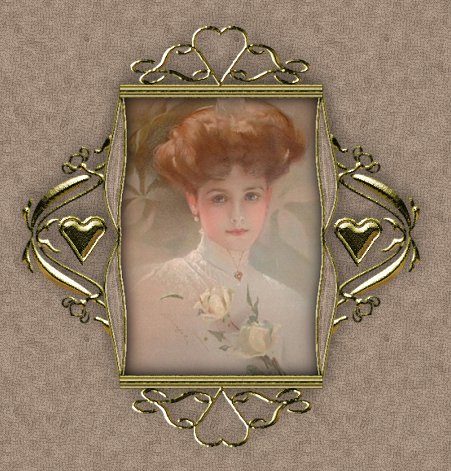 It was love at first sight. He opened the door and came in without looking at anything other than her. Approaching little by little he got to the counter where she was. She looked at him and smiling said to him:
It was love at first sight. He opened the door and came in without looking at anything other than her. Approaching little by little he got to the counter where she was. She looked at him and smiling said to him:
—May I help you?
While he thought that that was the most beautiful smile he had ever seen in his whole life, he felt desires to kiss her at that same instant. Stuttering he said:
—Yeah, eeehhh, uuuhhh… I’d like to buy a CD.
Without thinking, he took the first he saw and handed her the money.
—Do you want me to wrap it?, asked the girl smiling again.
He answered affirmatively, nodding, and she went into the store to come back with the package wrapped and gave it to him. He took it and left the store. He went home, and since that day on he visited the store every day to buy a CD. The girl always wrapped it for him to and he then carried it home and put them in his closet.
He was very shy to invite her to go out and although he tried, he could not. His mother found this out and encouraged him to dare, so the following day he filled himself with courage and he headed to the store.
As on the other days he bought again a CD, and as usual, she went to the back to wrap it. He took the CD, and while she was not seeing, he quickly left his phone number on the counter and running left the store.
Ringggg!!! His mother answered:
—Hello? It was the girl, she asked for her son and the mother disconsolate started to cry while saying:
—What? Don’t you know?… he died yesterday.
It was a moment of prolonged silence, except by the laments of the mother. Later, the mother entered her son’s room to remember him. She decided to start by seeing his clothes, so she opened his closet. To her surprise she found piles of wrapped CDs. Not even one was open.
That stirred her curiosity to see some many and could not resisted it; she took one and sit on bed to see it; when doing so, a little piece of paper came out of the plastic box. The mother picked it up to read it, it said:
"Hi!!!, you are super handsome, would you like to go out with me? ILY….Sofía.
With so much emotion the mother opened some others and other pieces of paper in various CDs said the same…
Moral:
That’s life, do not wait too long to say to that especial one what you feel for him/her. Say it today. Tomorrow it may be too late.
Back
![]()
Unknown Author
(Original texts in Spanish, translation)


A little girl was talking to her teacher about whales. The teacher said that was physically impossible that a whale swallowed a human being because even though it was a very big mammal its throat was too small. The girl affirmed that Jonah had been swallowed by a whale.
Irritated the teacher repeated that a whale could not swallow any human being; physically it was impossible. The little girl said:
—When I arrive to Heaven I will ask Jonah.
The teacher asked her:
— And what happens if Jonah went to Hell?
The girl answered her:
—Then should be you who should ask him.
""""""""""""""""""""""""""""""""""""""
 A teacher of a kindergarten was observing the children of her class while they were drawing. Occasionally she walked around the room to see the works of each child. When she arrived where a little girl was working diligently, she asked her what she was drawing. The girl replied:
A teacher of a kindergarten was observing the children of her class while they were drawing. Occasionally she walked around the room to see the works of each child. When she arrived where a little girl was working diligently, she asked her what she was drawing. The girl replied:
—I am drawing God.
The teacher stopped and said:
—But nobody knows how God is.
Without blinking, and without raising her gaze from the drawing, the girl answered:
—You will know within a minute.
""""""""""""""""""""""""""""""""""""""
An honest seven-year-old girl admitted calmly to her parents that Luis Miguel had kissed her after class.
— How did it happen so?, astounded her mother asked.
—It was not easy, admitted the little Miss, but three girls helped me grab him.
""""""""""""""""""""""""""""""""""""""
 One day a little girl was sitting observing her mom do dishes in the kitchen. Suddenly she noticed her mom had some gray hair standing up among her dark hair. She looked at her mom and asked her inquisitively:
One day a little girl was sitting observing her mom do dishes in the kitchen. Suddenly she noticed her mom had some gray hair standing up among her dark hair. She looked at her mom and asked her inquisitively:
—Why do you have some white hair, mommy?
Her mom answered:
—Well, each time you do something bad and make me cry or make me sad, one of my hairs turns white.
The girl digested this revelation for a while and then she said:
—Mommy, why ALL the hairs of my grandma are white?
""""""""""""""""""""""""""""""""""""""
A little three-year-old boy went with his dad to see a bed of recently-born puppy cats. Returning home, he hurriedly informed mom that there were two male little cats and two female little cats.
— How did you know? —asked his mom.
—Daddy lifted them up and looked underneath —replied the little boy—. I think there they have the tag.
""""""""""""""""""""""""""""""""""""""
 All the children were in the photograph and the teacher was trying to persuade each one of them to buy a copy of the group photograph.
All the children were in the photograph and the teacher was trying to persuade each one of them to buy a copy of the group photograph.
—Imagine how nice it would be when you are already grown up and you say: there is Catherine, she is a lawyer; or also that is Mike, now is a doctor.
From the back of the classroom sounded a little voice:
—And there is the teacher. She’s already dead.
Moral: Do not argue with children.
Back
![]()
From the Spanish version of "Who Can Make It Dawn?" ("¿QUIEN PUEDE HACER QUE AMANEZCA?"), written by Anthony de Mello, S.J.
A foreigner who was looking for the divine things asked the Master how could he, when returning to his country, distinguish between a true and a false master.
The Master said to him:
—The good one proposes practices; the bad master proposes theories.
—But, how could I distinguish between a good and a bad practice?
—In the same way as a farmer distinguishes between a good and a bad cultivation.
Back
![]()
Unknown Author
(Original text in Spanish, translation)
Tells the legend that in the beginning of the world when God decided to create woman found that He had exhausted all the solid materials in man and did not have more with which to dispose. Before this dilemma and after a deep meditation, He did this:
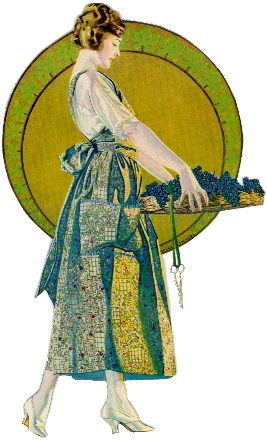
![]() He took the roundedness of the Moon,
He took the roundedness of the Moon,
![]() The soft curves of the waves,
The soft curves of the waves,
![]() The tender adhesion of the climbing plant,
The tender adhesion of the climbing plant,
![]() The trembling movement of the leaves,
The trembling movement of the leaves,
![]() The svelteness of the palm tree,
The svelteness of the palm tree,
![]() The delicate shade of the flowers,
The delicate shade of the flowers,
![]() The loving look of the deer,
The loving look of the deer,
![]() The happiness of the sun and the tear drops of clouds,
The happiness of the sun and the tear drops of clouds,
![]() The inconsistency of the wind and the fidelity of the dog,
The inconsistency of the wind and the fidelity of the dog,
![]() The shyness of the turtledove and the vanity of the peacock,
The shyness of the turtledove and the vanity of the peacock,
![]() The softness of the swan feather and the hardness of diamond,
The softness of the swan feather and the hardness of diamond,
![]() The sweetness of the dove and the cruelness of the tiger,
The sweetness of the dove and the cruelness of the tiger,
![]() The heat of fire and the coldness of snow.
The heat of fire and the coldness of snow.
He mixed so unequal ingredients, formed the woman and gave her to man.
After a week, man came and said:
—Lord, the creature You gave me makes me unhappy, she wants all my attention, never leaves me alone, she chats incessantly, she cries without a reason, it looks like she enjoys making me suffer and I come here to return her because I can no longer live with her!!!
—Well, answered God and took the woman back.
A week passed, man came back and said:
—Lord, I find myself so lonely since I returned the creature You did for me, she sang and played at my side, she looked with tenderness and her sight was as a caress, she laughed and her laughter was music, she was beautiful to see and soft to touch. She took care of me and protected me when I needed it, she gave me sweetness, tenderness, comprehension and love without conditions, please, God, give her back to me, because I cannot live without her!!!
—I see, said God, now you value her qualities, that makes me happy very much. Of course, you can have her back, she was created for you, but do not forget to take care of her, love her, respect her and protect her, because if you do not do so, you run the risk of staying without her again…
Back
![]()
Unknown Author
(Original text in Spanish, translation)
One night a woman was at the airport waiting for several hours before the departure of her flight. While waiting she bought a book and a package of cookies to pass the time. She looked for a seat and sat to wait. She was very absorbed reading her book, when suddenly she noticed that the young man who had seated beside her reached out his hand, freshly picking the package of cookies between them and started to eat them, one by one. Not wanting to make a scene she tried to ignore him. A little upset the lady ate the cookies and looked at the watch, while the young cookie-thief, without shame was almost finishing them too. The lady started to get more irritated and thought to herself:
"If I were not so good and educated, I have already left a bruise in the eye of this disrespectful".
Each time she ate a cookie, he also ate one. The dialog of their looks continued when one cookie was left, they wondered who would do it. With gentleness and with a nervous smile, the young reached out his hand, took the last cookie, broke it in two and offered half to the lady while he ate the other half. She took the half cookie brusquely of his hand and thought:
"What an insolent this man is! How so uneducated!He not even thanked you me! Never before I had known somebody so fresh…"
She sighed with anxiety when her flight was announced. She took her luggage and headed to the embarking gate refusing to look in the direction where was sitting that ungrateful thief. After having boarding the plane and being comfortably sitting, she looked for her book that she had almost finished reading. When looking for her book inside her bag she was totally surprised when she found the package of cookies almost intact.
"But my cookies are here", she thought and grieved, "the other ones were his, and he tried to share them with me."
Too late to apologize to the young man, she said slowly to herself that she had been the insolent one, the ill educated, the thief and that she did not know it.
How many times in our lives we have known for sure that something was of a certain way, only to discover that what we thought was true. . . was not? How many times the distrust stirred in us makes us judge unjustly other people with preconceived ideas, many of which are away from reality.
For that, we should think very well before we judge others. Let’s give them the benefit of a doubt before we think wrong of others.
Back
![]()
Unknown Author
(Original text in Spanish, translation)

Lynell Waterman tells the story of a blacksmith that, after a youth full of excesses, decided to surrender his soul to God. After many years of tenacious work, he practiced charity, but, in spite of his dedications nothing seemed to go right in his life, on the contrary, his problems and debts accumulated each day. A beautiful afternoon a friend visiting him, and who felt compassion for his situation, commented him:
—Really it is extraordinary that after you just have decided to turn into a man with fear of God, your life has started to turn into worse. I do not want to weaken your faith, but in spite of your beliefs in the spiritual world, nothing has improved.
The blacksmith did not respond immediately since he had already thought about it many times, without understanding what was happening with his life, however, since he did not want to leave his friend without an answer, he started to talk, and ended up finding the explanation he was looking for. Here it is what the blacksmith said:
—In this workshop I receive steel like this, without any work, and I must transform it into swords.
—Do you know how this is done?
—First, I heat the sheet of steel to an infernal heat, until it turns red hot. Then, without any compassion, I take the very heavy hammer and apply to it several blows, until the piece takes the desired shape. Then I submerge it in a bucket of cold water and the whole workshop gets filled with the noise of the water steam, because the piece bursts and cries out as a result of the violent change of temperature. I have to repeat this process until I obtain the perfect sword: just one time is not enough.
The blacksmith made a long pause, and continued:
—Sometimes the steel that arrives to my hands is not able to withstand this treatment. The heat, the hammer blows and the cold water end up filling it with cracks. At that moment, I realize that I will never be able to transform it into a good sword blade. And then, I simply leave it on the mountain of old iron you see at the entrance of my iron workshop.
He made another pause and the blacksmith finished:
—I know that God is placing me in the fire of afflictions. I accept the hammer blows that life is giving me, and sometimes I feel as cold and insensible as the water that makes the steel suffer. But I think the thing is: "My God, do not desist until I be able to take the shape You expect of me. Try it the way You consider it best, for the time You want—but never put me in the mountain of old iron of the souls."
Back
![]()
Unknown Author
(Original text in Spanish, translation)
One day an angel knelt down at the feet of God and said:
—Lord, I visited all of Thy creation. I went to all the chants. I was in all places. I saw that Thou art part of all things. And for that I came to Thee, Lord, to try to understand why each one of the persons on Earth has only one wing? We, the angels, have two. We can always go up as we wish to were Love the Lord represents is. We can always fly to freedom as we want. But humans with their only one wing cannot fly. They will not be able to fly with only one wing…
God responded:
—Yes, I know about that. I know that I made humans with only one wing…
Intrigued the angel wanted to understand and asked:
—But, why the Lord gave to men only one wing when two are needed to be able to fly?
Without hurry, God responded:
—They can fly yes, my angel. I gave humans just one wing so that they might fly more and better than Myself or your Archangels. To fly you need your two wings. And even though free, you are alone… But humans… humans with their only wing need always to tend the hands to someone in order to have a pair of wings… Each one has to look for a second wing in someone else, in some place of the world… in order to complete his pair. That way all will learn to respect and do not break the only wing of the other person, because they may be finishing their own chances of flying. Thus, my angel, they will learn to love truly the other person… They will learn that only allowing themselves to love they will be able to fly. Touching the heart of the other person they will be able to find the wing they are missing and will be able to finally fly. Only through love will they be able to arrive where I AM… just like you do, my angel. And they never, ever will be solitary when flying.
May you, if you have not found your other wing, one day very near, find it. And both soar up in a magnificent fly.
Back
![]()
![]() Explanation of Pinocchio’s Story
Explanation of Pinocchio’s Story
Unknown Author
(Original text in Spanish, translation)

 The tale of Pinocchio is the story of the human soul in its journey of spiritual evolution. Pinocchio was created under the influence of two personages, one male and one female (which symbolizes the two aspects of God.)
The tale of Pinocchio is the story of the human soul in its journey of spiritual evolution. Pinocchio was created under the influence of two personages, one male and one female (which symbolizes the two aspects of God.)
He was carved by the carpenter Geppetto, and the Blue Fairy gave him life. At the same time, the Fairy chose a cricket called Jiminy Cricket and entrusted him with a mission: to remain near Pinocchio and to be his consciousness (This means next to each soul God puts the consciousness of Truth, which accompanies it always within itself.)
Geppetto’s main desire is that Pinocchio become a true child. And he knows that his wish only can become true if Pinocchio learn and grow, so he sends him to school, (our unfoldment is a permanent learning process.)
 Pinocchio comes out of the main door led by his father, and he does it loaded with purpose, with the deep yearning to become something superior: a true child. But when he comes out to the world the problems start. Making use of his recently discovered freedom, Pinocchio makes some wrong decisions, and succumbs before the temptation of pride. In spite of all protests of Jiminy Cricket he followsJ. Worthington Foulfellow and he joins a traveling marionette show. (The fundamental characteristic of the soul is its free will so that we can choose at any time.)
Pinocchio comes out of the main door led by his father, and he does it loaded with purpose, with the deep yearning to become something superior: a true child. But when he comes out to the world the problems start. Making use of his recently discovered freedom, Pinocchio makes some wrong decisions, and succumbs before the temptation of pride. In spite of all protests of Jiminy Cricket he followsJ. Worthington Foulfellow and he joins a traveling marionette show. (The fundamental characteristic of the soul is its free will so that we can choose at any time.)
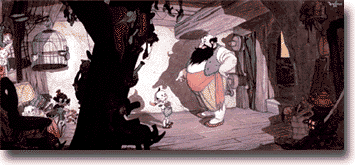 In its theatrical representation Pinocchio receives great rounds of applause, and he is very happy, but after the show he was imprisoned in a cage (To be carried away by pride, by the "self", can gives us pleasure, but in the long run it always produces pain, because it enslaves the soul.)
In its theatrical representation Pinocchio receives great rounds of applause, and he is very happy, but after the show he was imprisoned in a cage (To be carried away by pride, by the "self", can gives us pleasure, but in the long run it always produces pain, because it enslaves the soul.)
The Blue Fairy comes in to him, asking for the cause of his confinement, and Pinocchio tries to justify himself before her by telling lies; but with each lie he tells his nose grows. Then Pinocchio discovers that evil cannot be hidden, and recognizes his errors with honesty, repenting of them (the same occurs with us; while we self-justify and do not recognize our errors before God and before ourselves, we cannot learn.)
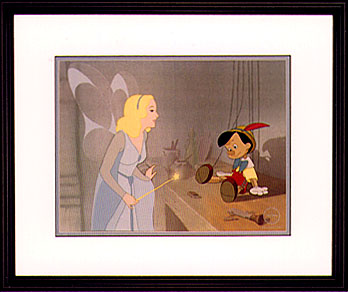 The Fairy then free him and he receives another opportunity. Jiminy Cricket is decided to help Pinocchio to not sidetrack from the right path, but it is not long before other temptations present themselves. Again appears J. Worthington Foulfellow who invites him to the Island of Pleasure, a place where children can enjoy all day long and satisfy all their wishes. Pinocchio cannot resist the attraction of traveling to the Isle and joins the group. (Our great temptation is to have not to exert ourselves, to receive all in exchange for nothing.)
The Fairy then free him and he receives another opportunity. Jiminy Cricket is decided to help Pinocchio to not sidetrack from the right path, but it is not long before other temptations present themselves. Again appears J. Worthington Foulfellow who invites him to the Island of Pleasure, a place where children can enjoy all day long and satisfy all their wishes. Pinocchio cannot resist the attraction of traveling to the Isle and joins the group. (Our great temptation is to have not to exert ourselves, to receive all in exchange for nothing.)
 And it happens that when Pinocchio and the other children have been in the Island too long, they start turning into donkeys and to forget even to speak. (The same happens with the human soul, when it is brutalized by the indifference and the permanent satisfaction of desire; it forgets who it is from and what is its mission.)
And it happens that when Pinocchio and the other children have been in the Island too long, they start turning into donkeys and to forget even to speak. (The same happens with the human soul, when it is brutalized by the indifference and the permanent satisfaction of desire; it forgets who it is from and what is its mission.)
But Pinocchio realizes on time what is going on. When he discovers he is growing donkey’s ears and tail, he turns to Jiminy Cricket to ask for help. This one saves him, because Jiminy Cricket knows how to escape from the Island. As soon as they are free they start looking for Geppetto. But they come home and discover that he has disappeared; he has gone to look for Pinocchio. (This image has a fundamental importance, since it brings to our understanding that not only we look for God, but God looks for us too.)
Pinocchio receives hints over his father’s whereabouts. He will be able to find him at the bottom of the sea, in the belly of a great whale that swallowed Geppetto’s boat. (The marine animal is an ancient symbol of the reconciliation between spirit and matter. The sea is a symbol of the unconscious. Thus, the tale tells us that we will find our spiritual inspiration, our true nature, in our own unconscious, in the depth of ourselves.)
When Pinocchio and Jiminy Cricket look for Geppetto in the sea, they are swallowed by the same whale. In the belly of this one happens a happy reunion of Pinocchio and his father, but soon they know they have to escape to continue together under the light of day and on firm land. (Say in a different way, our spiritual trip does not end when we start reuniting with our spiritual depths in our dreams, in our prayers, or in our meditations. The following step is to carry this superior state of consciousness to daily life, and that is the most difficult.)
In this tale Pinocchio has a plan. It occurs to him a way to escape that requires much strength and courage, and he achieves it. But when they are in the middle of the sea, Geppetto seems like he is going to drown and Pinocchio sacrifices himself to save him. (And this is precisely the key, what is going to make him worthy of becoming a true child; the unselfish love. When the need of other is more important than mine, when "I" lets go of being "me" and the center of my life, the door that allows the miracle pass is opened.)
When Geppetto is coming to on the shore, he finds besides him the lifeless body of his son. Highly affected, he takes it home and puts it in bed. But the action of love of the child, giving his life for his father has made him worthy of being a true child. He resurrects and then fulfills his destiny; to become a true child. (This tale is a symbol of our own journey of spiritual unfoldment.)
The meaning of life is that we follow the process of recognizing our true nature in God: Conscious and co-creators. All the key for that is love, the unselfish offering that means the renouncement of the personal and selfish "I". The purpose of life we men/women share is to manifest in the finite the infinite, to carry the divine in the human, to give individual expression to our spiritual qualities.
Back
![]()
From the Spanish version of "Who Can Make It Dawn?" ("¿QUIEN PUEDE HACER QUE AMANEZCA?"), written by Anthony de Mello, S.J.
The distressed stock broker, who had lost a fortune, came to the monastery searching for inner peace. But he was too disturbed to meditate.
Once that man had left, the Master, as an insinuation, said only one sentence: "Those who sleep on the floor never fall from bed."
Back
![]()
![]() Big Muddy Puddles and Sunny Dandelions
Big Muddy Puddles and Sunny Dandelions
Unknown Author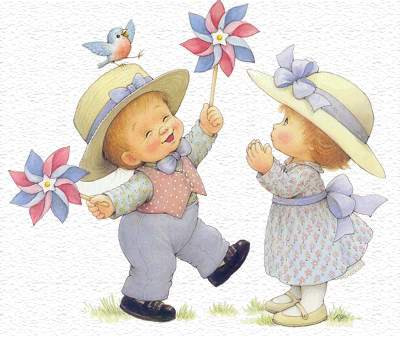
When I look at a patch of dandelions, I see a bunch of weeds that are going to take over my yard. My kids see flowers for Mom and blowing white fluff you can wish on.
When I look at an old drunk and he smiles at me, I see a smelly, dirty person who probably wants money and I look away. My kids see someone smiling at them and they smile back.
When I hear music I love, I know I can’t carry a tune and don’t have much rhythm so I sit self-consciously and listen. My kids feel the beat and move to it. They sing out the words. If they don’t know them, they make up their own.
When I feel wind on my face, I brace myself against it. I feel it messing up my hair and pulling me back when I walk. My kids close their eyes, spread their arms and fly with it, until they fall to the ground laughing.
When I pray, I say thee and thou and grant me this, give me that. My kids say, "Hi God! Thanks for my toys and my friends. Please keep the bad dreams away tonight. Sorry, I don’t want to go to Heaven yet. I would miss my Mommy and Daddy."
When I see a mud puddle I step around it. I see muddy shoes and dirty carpets. My kids sit in it. They see dams to build, rivers to cross and worms to play with.
I wonder if we are given kids to teach or to learn from?
No wonder God loves the little children!! Enjoy the little things in life, for one day you may look back and realize they were the big things.
I wish you BIG MUD PUDDLES and SUNNY YELLOW DANDELIONS.
Back
![]()
Unknown Author
(Original text in Spanish, translation)
![]() When I observe the land without plowing, when the agricultural implements are forgotten, when the land is parched, I ask myself: Where may God’s hands be?
When I observe the land without plowing, when the agricultural implements are forgotten, when the land is parched, I ask myself: Where may God’s hands be?
![]() When I observe injustice, corruption, he who exploits the weak, when I see the pedantic prepotent get rich from the ignorant and poor, from the labor worker and the farmer lacking resources to defend their rights, I ask myself: Where may God’s hands be?
When I observe injustice, corruption, he who exploits the weak, when I see the pedantic prepotent get rich from the ignorant and poor, from the labor worker and the farmer lacking resources to defend their rights, I ask myself: Where may God’s hands be?
![]() When I look at the forgotten old lady, when her look is nostalgic and still babbles some words of love for the child that abandoned her, I ask myself: Where may God’s hands be?
When I look at the forgotten old lady, when her look is nostalgic and still babbles some words of love for the child that abandoned her, I ask myself: Where may God’s hands be?
![]() When I see the dying in his agony full of pain, when I observe his partner and children wishing no suffer for him, when suffering is intolerable and his bed turns into a cry of supplication for peace, I ask myself: Where may God’s hands be?
When I see the dying in his agony full of pain, when I observe his partner and children wishing no suffer for him, when suffering is intolerable and his bed turns into a cry of supplication for peace, I ask myself: Where may God’s hands be?
![]() When I look at that youth, before strong and determined, now besot by drug and alcohol, when I see shaky what was before a brilliant intelligence and now being in rags without direction nor destination, I ask myself: Where may God’s hands be?
When I look at that youth, before strong and determined, now besot by drug and alcohol, when I see shaky what was before a brilliant intelligence and now being in rags without direction nor destination, I ask myself: Where may God’s hands be?
![]() When I see that little girl, who should be dreaming fantasies, dragging her existence and in her face already reflected the weariness of living, and looking for survival she paints her lips and tights her dress and goes out to sell her body, I ask myself: Where may God’s hands be?
When I see that little girl, who should be dreaming fantasies, dragging her existence and in her face already reflected the weariness of living, and looking for survival she paints her lips and tights her dress and goes out to sell her body, I ask myself: Where may God’s hands be?
![]() When that little boy at 3 o’clock in the morning offers me a newspaper, his miserable sweet candy box without selling yet, when I see him sleep at the door of a hall trembling of cold, with some newspaper covering his fragile little body, when his look asks me for a caress, when I see him without hope wandering with the only companionship of a street dog, I ask myself: Where may God’s hands be?
When that little boy at 3 o’clock in the morning offers me a newspaper, his miserable sweet candy box without selling yet, when I see him sleep at the door of a hall trembling of cold, with some newspaper covering his fragile little body, when his look asks me for a caress, when I see him without hope wandering with the only companionship of a street dog, I ask myself: Where may God’s hands be?
""""""""""""""""""""""""""""""""""""""
 And I face Him and ask:
And I face Him and ask:
—Where are Thy hands, Lord?, to fight for justice, to give a caress, a consolation to the abandoned, to rescue youth from drugs, to give love and tenderness to the forgotten.
After a long pause I heard His voice that demanded at me:
—Don’t you realize you are my hands, dare to use them for what they were made, to give love and to reach stars.
And I understood that the hands of God are "YOU" and "ME", the ones that have willingness, knowledge and courage to fight for a more just and humane world, those whose ideals be so high that cannot but come to the call of destiny, those who, defying pain, criticism and blasphemy challenge themselves to be the hands of God.
—Lord, now I realize that my hands are empty, that have not given what they suppose to give, I ask forgiveness by the love Thou gave me and that I have not known how to share, I must use them to love and to conquer the greatness of Creation.
The world need those hands, full of ideals and stars, whose grand work be to contribute day by day, to forge a new civilization, to look for superior values, to share generously what God has given us and that at the end may arrive empty because they gave all the love for which they were made and God surely will say:
—THOSE ARE MY HANDS!
Back
![]()
![]() Sleeping While Koran Is Being Read
Sleeping While Koran Is Being Read
As told by Paulo de Coelho
(Original text in Spanish, translation)
Saadi of Shiraz told the following story:
“When I was a child I used to pray with my father, my uncles and cousins. Every night we got together to listen to a piece of Koran.
"One of those nights, when my uncle read, I noticed that the majority of present were sleeping. Then I commented to my father:
—None of those sleepers is capable of remaining alert to the words of the prophet. They will never get to God!
"And my father answered:
—Dear son, look for your path with faith and let each one worry about themselves. Perhaps in their dreams they are conversing with God. For me it would be thousand times preferable that you would have been sleeping with them than to have to listen to this harsh judgment and this condemnation.“
Back
![]()
As told by Paulo de Coelho
(Original text in Spanish, translation)

Rabbi Elimelekh had done a beautiful preaching and now was returning to his native land. To honor him and to show gratitude, the faithful decided to follow the carriage of Elimelekh until it left the city.
At a determined moment the rabbi stop the carriage, asked the coachman to continue ahead without him and moved to join the people.
—Beautiful example of humility, said one of men at his side.
—There is no humility in my gesture, but only a little of intelligence. You here are doing exercise, singing, drinking wine, fraternizing, meeting new friends, and all because of an old rabbi that came to speak about the art of living. Then let my theories follow that carriage, because I want to participate in the action, answered Elimelekh.
Back
![]()
![]()
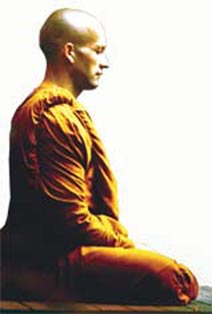 Praying for Everybody’s Health
Praying for Everybody’s Health
Buddhist story as told by Paulo de Coelho
(Original text in Spanish, translation)
A farmer who had a sick wife asked for a series of prayers to a Buddhist priest. The priest started to pray, asking God to heal all the sick.
—Just a moment —interrupted the farmer—. I asked you to pray for my wife and you are asking for all the sick.
—I am praying for her.
—But you ask for everybody. You may end up benefiting my neighbor, who is also sick, and I do not appreciate him.
—You do not understand anything about healing —said the monk, moving apart—. By asking for all the sick, I am joining my prayers to those of millions of persons who are now praying for their sick. Adding up, these voices arrive to God and benefit all. Divided, they lose strength, and arrive nowhere.
Back
![]()
Unknown Author
(Original text in Spanish, translation)
It is told that in certain occasion a Seeker of Truth went out by the roads of the world. And there, in the grand crossing of the world, interrogated his brothers:
—Tell me, what is truth?
—Look for philosophy —answered the philosophers.
—No —argued the politicians—. Truth is in service.
—Enter the cathedrals —reassured the clergy.
—Without any doubt, truth is wisdom —declared the wise.
—-Renunciation to all —brandished the ascetic.
—Contemplate and praise the marvels of the Lord —announced the mystics.
—Respect and follow the laws —pointed out the rulers.
—Know Thyself —sang the guardians of esoterism.
—Truth is in sacred numbers —deducted the cabalists.
—Live the pleasures —advised the epicureans.
—Join us —cried out the revolutionaries.
—Truth is a myth —answered the skeptics.
—Live and let others live —claimed the existentialists.
—Past is the only truth —lamented the nostalgic.
Confused that human let himself fall on the dust of the road, while that multitude went away singing and vindicating "their" truth.
 At that time a venerable old man happened to pass by the man carrying a refulgent diamond.
At that time a venerable old man happened to pass by the man carrying a refulgent diamond.
— Who are you?, asked the defeated Seeker of Truth.
And the old man, showing him the diamond, answered:
—I AM THE GUARDIAN OF TRUTH.
— Truth? Does it exist?
The old man smiling and approaching the gem to the face of the human, replied:
—TRUTH, as this treasure, has thousand facets. Corresponds to each one to find out which one falls to him.
Back
![]()
From the Spanish version of "Who Can Make It Dawn?" ("¿QUIEN PUEDE HACER QUE AMANEZCA?"), written by Anthony de Mello, S.J.
— How can we distinguish between the true and the false mystic?, asked some disciples excessively interested by the mysterious and occult.
— How could you distinguish between he who truly sleeps and he who feigns sleeping?, replied the Master.
— There is no way to distinguish them. Only the sleeper knows when he is feigning, said the disciples.
The Master smiled.
Later he said:
— He who feigns sleeping can deceive others, but not to himself. Unfortunately, a false mystic can deceive both others and himself.
Back
![]()
![]() The Story of "The Last Supper" by Leonardo Da Vinci
The Story of "The Last Supper" by Leonardo Da Vinci
Unknown Author
(Original text in Spanish, translation)
There is an anecdote of the great painter, sculptor and inventor, Leonardo Da Vinci, about his painting "The Last Supper", one of his works presently most copied and sold.
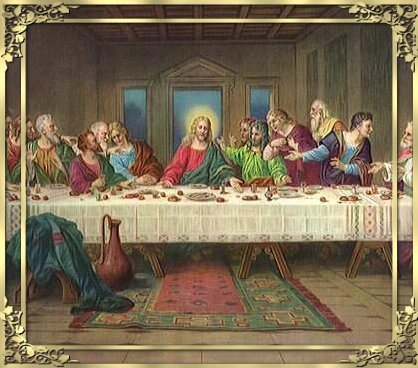 It took 20 years to make it due to the fact that he was very strict at choosing people who would pose as models. He had problems to initiate the painting because did not find a model to represent Jesus, who should reflect in his face purity, nobility and the most beautiful feelings. He also should posses an extraordinary virile beauty. At last he found a young man with these characteristics, he was the first he painted. Then he was finding the eleven apostles, whom he painted together, leaving Judas Iscariote pending, since he did not find the adequate model. This should be a person of mature age and showing in his face the marks of treason and avarice. Thus the painting was unfinished for a long time, until they told him of a terrible criminal they had jailed. He went to see him, and he was exactly the Judas he wanted for finishing his work, for what he asked the mayor if he would allow the defendant to pose for him. The mayor, knowing the fame of the master Da Vinci, gladly accepted and the accused was taken to the painter’s studio, guarded by 2 guards and chained.
It took 20 years to make it due to the fact that he was very strict at choosing people who would pose as models. He had problems to initiate the painting because did not find a model to represent Jesus, who should reflect in his face purity, nobility and the most beautiful feelings. He also should posses an extraordinary virile beauty. At last he found a young man with these characteristics, he was the first he painted. Then he was finding the eleven apostles, whom he painted together, leaving Judas Iscariote pending, since he did not find the adequate model. This should be a person of mature age and showing in his face the marks of treason and avarice. Thus the painting was unfinished for a long time, until they told him of a terrible criminal they had jailed. He went to see him, and he was exactly the Judas he wanted for finishing his work, for what he asked the mayor if he would allow the defendant to pose for him. The mayor, knowing the fame of the master Da Vinci, gladly accepted and the accused was taken to the painter’s studio, guarded by 2 guards and chained.
During all the time that the defendant posed he did not show any emotion for being selected as model, showing himself too quiet and distant. At the end, Da Vinci, satisfied with the result, called the accused and showed him the work; when the accused saw it, extremely impressed, fell on his knees, crying.
Da Vinci, surprised, asked him the reason of his attitude, to what the prisoner answered:
—Master Da Vinci, don’t you remember me by chance?
Da Vinci observing him fixedly answered:
—No, never before I have seen you.
Crying and asking forgiveness to God, the accused told him:
—Master, I was that youth who 19 years ago you chose to represent Jesus in this same painting.
The moral of this story is that no matter how much physical beauty you posses, it is the inner beauty what in time finally comes out to shine on us and thusly inevitably is marked in our face.
Back
![]()
Unknown Author
(Original text in Spanish, translation)
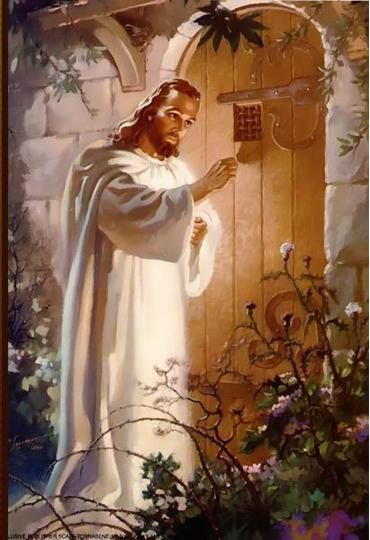 A man had painted a beautiful painting. The day of the presentation to the public local authorities, photographers, news reporters, and many people attended, since it was all about a famous painter, recognized artist. At the convened moment the woolen cloth that veiled the painting was drawn. It was a warmed applause.
A man had painted a beautiful painting. The day of the presentation to the public local authorities, photographers, news reporters, and many people attended, since it was all about a famous painter, recognized artist. At the convened moment the woolen cloth that veiled the painting was drawn. It was a warmed applause.
It was an impressing figure of Jesus softly knocking at the door of a home. Jesus looked alive. With his ear close to the door he seemed wanting to hear if somebody inside the house would respond to him.
Everybody admired that precious work of art. A very curious observer found a fault in the painting. The door had no lock. And went to ask the artist:
—Your door has no lock! How can it be opened?
The painter took the Bible, looked for a verse and asked the observer to read it:
Apocalypse 3, 20: "Behold, I stand at the door, and knock: if any man hear my voice, and open the door, I will come in to him, and will sup with him, and he with me.”
—So it is—answered the painter—.This is the door of man’s heart. It can only be opened from within.
![]()
 From: "Stories to Reflect Upon II" ("Historias para Reflexionar II", Unknown Author.
From: "Stories to Reflect Upon II" ("Historias para Reflexionar II", Unknown Author.
(Original text in Spanish, translation)
Click here to listen to "La Hiedra" ("The Ivy") music.
![]()
A man built his house. And he embelishedit with an inner garden. In the center he planted an oak tree. And the oak tree grew slowly. Day after day it sprouted roots and made its stalk stronger, turning it intoa trunk, capable of resisting winds and storms.
 Near the wall of his house the man planted an ivy and the ivy started to rise up swiftly. Every day it extended its tentacles full of suckers, and it was rising adhered to the wall.
Near the wall of his house the man planted an ivy and the ivy started to rise up swiftly. Every day it extended its tentacles full of suckers, and it was rising adhered to the wall.
After some time the ivy walked on the tile roofs. The oak tree grew silently and slowly.
—How are you, oak friend?, asked one morning the ivy.
—Well, my friend, answered the oak tree.
—That you say because you never arrived to this height —added the ivy with a lot of irony—. From here everything looks different. Sometimes I feel sorry to see you always there in the bottom of the patio.
—Do not make fun of me, my friend —answered very humbly the oak tree—. Remember that the important is not to grow quickly but with firmness.
Then the ivy burst into a mocking laughter.
And time continued its course. The oak tree grew with firm and slow rhythm. The walls of the house turned old.
A strong storm shook with a cyclone the house and its garden. It was a terrible night. The oak tree clang to its roots to keep straight. The ivy clutched with its suckers the old wall to not be knocked down. The fight was hard and long.
At dawn the owner of the house strolled through the garden, and he saw that the ivy had been detached from the wall, and was tangled over itself, on the ground, at the foot of the oak tree. And the man uprooted the ivy and burned it.
Meanwhile the oak reflected:
—It is better to grow over your own roots and to create a strong trunk, than to gain height fast, hanging on the security of others.
Back
![]()
Unknown Author
(Original text in Spanish, translation)
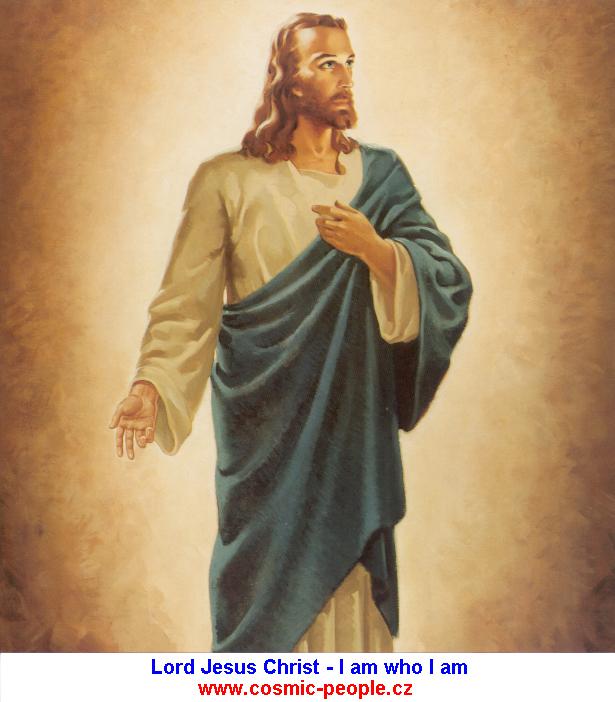 Once upon a time there was a master who spoke to a group of people and his message was so marvelous that all people gathered there were moved by his words of love. In the midst of that multitude was a man who had listened to all the words the master had pronounced. He was a very humble man and of great heart, who felt so moved by the master’s words that he felt the need of inviting him to his home.
Once upon a time there was a master who spoke to a group of people and his message was so marvelous that all people gathered there were moved by his words of love. In the midst of that multitude was a man who had listened to all the words the master had pronounced. He was a very humble man and of great heart, who felt so moved by the master’s words that he felt the need of inviting him to his home.
So when the master finished speaking, the man forced his way through the crowd, he carried himself to him and, when looking at his eyes, he told him:
—I know you are very busy and that everybody requires your attention. Also I know that you almost do not have time not even to listen to my words, but my heart feels so free and it is so much the love I feel for you that I’m moved by the necessity to invite you to my home. I want to prepare for you the best of meals. I do not hope you to accept it, but I wanted you to know it.
The master looked at his eyes, and with the most beautiful of smiles, he answered:
—Prepare everything. I will go.
Then the master went away.
When he heard these words the heart of the man was filled with joy. He could hardly wait the moment to arrive when serving the master and expressing to him the love he felt for him. It would be the most important day in his life: he would be with him. He bought the best food and best wine and looked for the most lovely clothes to offer them to him as a gift. Then he ran to his home in order to carry out all the preparations to receive the master. He cleaned everything, prepared a delicious meal and beautifully decorated the table. His heart was overflowing with happiness because the master soon would be there.
The man waited anxiously when somebody knocked at the door. He opened it with eagerness but, instead of the master, he found an old lady. This one looked at him and said:
—I’m hungry. May you give a piece of bread?
He felt a little disappointed to see that it was not the master. He looked at the woman and said:
—Please come into my house.
He sat her in the place he had prepared for the master and offered her the food he had prepared for him. But he was anxious and expected the woman to hurry up finishing eating. The old woman was moved for the generosity of this man. She thanked him and left.
He had just finished again preparing the table for the master when somebody knocked at the door again. This time was an unknown that had traveled through the desert. The foreigner looked at him and said:
—I’m thirsty. May you give me something to drink?
Again he felt a little disappointed because it was not the master, but even then, he invited the unknown to enter the house, asked him to sit in the place he had prepared for the master and served him the wine he wanted to offer him. When he left he again prepared all the things.
For the third time, somebody called at the door and when he opened it, he found a child. This one rose his gaze at him and said:
—I’m freezing. May you give me a blanket to cover my body?
He was a little disappointed because it was not the master, but looked at the child’s eyes and felt love in his heart. Rapidly he got the clothes he had purchased for the master and covered him with them. The child thanked him and left.
He prepared again all for the master and then he decided to wait for him until it was late. When he realized that he would not come he felt disappointed, but forgave him immediately. He said to himself: “I knew I could not expect that the master would come to this humble home. He told me he would, but some affair of more importance had taken him to some other place. He has not come, but at least he accepted the invitation and that is sufficient for my heart to feel happy.”
Then he put away the food and the wine and went to bed. That night he dreamed the master visited him. When he saw him he felt happy without knowing it was a dream. “The master has come! He kept his promise.”
The master answered him:
—Yes, I am here, but I was here before. I was hungry and you gave me food. I was thirsty and you offered me wine. I was cold and you covered me with clothes. All you do for others, you do for me.
He woke up with his heart brimming of joy because he had understood the teaching of the master. He loved him so much that he had sent three persons to transmit to him the greatest lesson: that he lives within all people. When you give food to the hungry, drink to the thirsty and cover to whom is cold, you offer your love to the MASTER.
Back
![]()
From: "Stories to Reflect Upon II" ("Historias para Reflexionar II", Unknown Author.
(Original text in Spanish, translation)
 A king received two small falcons as a gift and gave them to the master of falconry to train them. After some months, the master informed the king that one of the falcons was perfectly, but he did not know what happened the other one since had not moved from the branch where he left him since the day he arrived.
A king received two small falcons as a gift and gave them to the master of falconry to train them. After some months, the master informed the king that one of the falcons was perfectly, but he did not know what happened the other one since had not moved from the branch where he left him since the day he arrived.—Bring me the author of that miracle.
—Did you make the falcon fly? How did you do it? Are you perhaps a magician?
Let’s reach heights before somebody cuts our branch.
Back
![]()
Unknown Author
(Original text in Spanish, translation)
 A soul recently arriving to Heaven found Saint Peter. The saint took the soul for a tour in Heaven. Both walked step by step for some great workshops full of angels. St. Peter stopped before the first section and said:
A soul recently arriving to Heaven found Saint Peter. The saint took the soul for a tour in Heaven. Both walked step by step for some great workshops full of angels. St. Peter stopped before the first section and said:
—This is the section of receiving. Here all petitions made to God through prayer are received.
The soul looked at the section and was terribly busy with many angels classifying written petitions in voluminous sheets of paper from peoples from all over the world.
They continued walking until arrived at the following section and St Peter said to her:
—This is the section of packaging and deliver. Here the favors and blessings people ask are packaged and sent to the persons that requested them.
The soul saw how busy it was. There were so many angels working in it as so many blessings were being packaged and sent to earth.
Finally, in the farthest corner of the room, the soul stopped at the last section. For her surprise, only an angel remained in it idle doing very little a thing.
—This is the section of gratitude —said St. Peter to the soul.
—How is it that there is so little work here? —asked the soul.
—This is the worst —answered St. Peter—. After the persons receive the blessings they requested, very few send their gratitude.
—How can one thank the blessings of God?
—Simple —answered St. Peter—. Only you have to say: Thank You, Lord.
Let’s always thank for the material and spiritual blessings we receive and collaborate with donations for the favors we receive according to the measure of our means because it is in giving that we receive.
Back
![]()
Unknown Author
(Original text in Spanish, translation)
 One afternoon a little one approached his mother, who was preparing lunch, and handed to her a sheet of paper in which there was something written….. After drying her hands in the apron, she read what it said…
One afternoon a little one approached his mother, who was preparing lunch, and handed to her a sheet of paper in which there was something written….. After drying her hands in the apron, she read what it said…
![]() For cutting the grass: $ 0.50
For cutting the grass: $ 0.50
![]() For cleaning my room this week: $ 1.00
For cleaning my room this week: $ 1.00
![]() For going to the convenience store in your place: $ 0.50
For going to the convenience store in your place: $ 0.50
![]() For taken care of my brother while you go shopping to the marketplace: $ 0.25
For taken care of my brother while you go shopping to the marketplace: $ 0.25
![]() For taking out the garbage: $ 1.00
For taking out the garbage: $ 1.00
![]() For having a good grade book: $ 5,00
For having a good grade book: $ 5,00
![]() For cleaning and sweeping the patio: $ 2.00
For cleaning and sweeping the patio: $ 2.00
![]() Total Charge: $ 14.75
Total Charge: $ 14.75
The mother stared at the child; he waited, full of expectation. Then she took a pencil, and in the back of the same sheet she wrote:
![]() For carrying you in my belly for 9 months: NOTHING
For carrying you in my belly for 9 months: NOTHING
![]() For so many a night of insomnia, to heal you and to pray for you: NOTHING
For so many a night of insomnia, to heal you and to pray for you: NOTHING
![]() For the problems and the crying you have caused to me: NOTHING
For the problems and the crying you have caused to me: NOTHING
![]() For the fears and worries that wait for me: NOTHING
For the fears and worries that wait for me: NOTHING
![]() For the meals, clothes and toys: NOTHING
For the meals, clothes and toys: NOTHING
![]() For cleaning up your nose: NOTHING
For cleaning up your nose: NOTHING
![]() TOTAL COST OF MY LOVE: NOTHING
TOTAL COST OF MY LOVE: NOTHING
When the son finished reading what his mother had written, he had his eyes in tears. He looked at her and said:
—I LOVE YOU SO MUCH, MAMA… —then he took a pencil and wrote:
—TOTALLY PAID
It is so great the figure of a MOTHER than even God wanted to have one…..
Back
![]()
Jorge Bucay
(Original text in Spanish, translation)
To Ioshua [Jesus] who encouraged himself to take the risk and flew…
 And when he became big, his father told him:
And when he became big, his father told him:
—My son, not everybody is born with wings. And even though it is true you are not obliged to fly, I think it would be shameful if you limit yourself to walk having the wings the good God gave you.
—But I do not know to fly —answered the son.
—Come —said the father.
He took him by the hand and by walking he took him to the edge of an abyss on the mountain.
—See, son, that is the empty space. When you want you can fly. You only should stand here, breathe deeply in, and jump to the abyss. Once in the air you extend your wings and you fly…
The son doubted:
—And if I fall?
—Even though you fall you will not die, only some bruises that will make you stronger for the next try —answered the father.
The son went to town, to his friends, to his peers, to his companions with which he had walked all through his life. The most little ones of the mind told him:
—Are you crazy?
—For what?
—Your father is in delirium…
—What are you looking for in flying?
—Why don’t you stop that silliness?
—Besides, who needs to fly, anyway?
The most lucid ones also were afraid:
—May it be true?
—Isn’t it dangerous?
—Why don’t you start slowly?
—In any case, try launching yourself from a stairway.
—…Or from the top of a tree, but… from the summit?
The youth listened to the advise of those who loved him. He climbed to the top of a tree and with courage jumped… He unfolded his wings. He beat them in the air with all his force… but the same… he precipitated on the ground… With a great bump on the forehead he passed by his father:
—You lied on me! I cannot fly. I tried, and look at the blow I received! I am not like you. My wings are only as an adorn… —he cried.
—My son —said the father— to fly you have to create the space of free air necessary for the wings to unfold. It is like when jumping with a parachute… you need certain height before jumping. To learn to fly you always need to start taking some risks.
If one does not want to take some risks, the best will be to resign efforts and to continue walking forever…
Back
![]()
Unknown Author
(Original text in Spanish, translation)
 A banker of American investment was in the pier of a Mexican coastal town when a little boat arrived with just one fisherman. Within the boat there were several yellow tuna fish of a good size.
A banker of American investment was in the pier of a Mexican coastal town when a little boat arrived with just one fisherman. Within the boat there were several yellow tuna fish of a good size.
The American praised the Mexican for the quality of the fish and asked him:
—How long did it take you to fish them?
—Only a little time —answered the Mexican.
—Why don’t you remain longer and take out more fish?, the American then asked.
The Mexican said that he had enough to satisfy the immediate needs of his family.
—But… what do you do with the rest of your time?, the American asked then.
—I sleep late, fish a little, play with my children, take a nap with my señora, María, go every night to town where I drink wine and play the guitar with my friends. As you see, I have a fun and busy life, said the Mexican fisherman.
The American replied:
—I am an MBA from Harvard and I could help you. You should spend more time fishing, with the income you should buy a bigger boat, with the income from the bigger boat you might buy several boats, eventually you would have a fleet of fishing boats. Instead of selling fish to an intermediary you might do it directly to a processor, eventually open your own processing factory. You should control production, processing and distribution. You should leave this "silly" town and go to Mexico City, then to Los Angeles and eventually New York, where you would manage your enterprise in expansion.
The Mexican fisherman asked:
—But, how long will this all take?
To which the American responded:
—Between 15 and 20 years.
—And then what?
The American smiled and said that this was the best part:
—When the hour arrives you should announce an IPO (Initial Purchase Offer of stocks) and sell the stocks of your company to the public. You would become rich, would have millions.
—Millions… and then what?
Said the American:
—Then you may retire. You move to a little town on the coast where your can sleep late, fish a little, play with your children, take a nap with your wife, go every night to town to drink wine and play the guitar with your friends.
Back
![]()
Unknown Author
(Original text in Spanish, translation)
![]()
A scientist lived very worried about the problems of the world and was determined to find means to diminish them. He spent days enclosed in his laboratory in search for answers to his doubts. Certain day, his son, seven years old, invaded his sanctuary decided to help him in his work. The scientist, nervous for the interruption, attempted to make his son go out to play someplace else. Seeing that it would be impossible to get him out of there the father supplied something to give his son with the aim to distract his attention…
He took suddenly the planisphere from a magazine, and, with a pair of scissors, he cut the map in several pieces. Along with a roll of adhesive tap he handed it to his son saying:
—Do you like puzzles? Then I’m going to give you the world to fix it. Here is the world all broken. See if you can fix it OK! Do it all by yourself.
He calculated that the child would take days to fix the map. Some hours later, he heard the voice of his son calling him calmly:
—Father, father, I already have done it all. I managed to finish it all!
At the beginning the father could not give credit to the words of his son:"Would it be possible at his age to manage to fix a map he had never seen before?" Then the scientist took his eyes away form the writings sure that he would see the work worthy of a child. To his surprise the map was complete. All pieces had been placed in their right places. How would that be possible? How could the child have been able to do it?
—You did not know how the world was, my son. How did you do it?
—…Father, I did not know how the world was, but when you removed the paper from the magazine to cut it, I saw that on the other side there was the figure of a man… When you gave me the world to fix it, I attempt it but I couldn’t do it. Then I remembered about the man, I turned over the cuttings and started to fix the man, whom I knew how he looked. I managed to fix the man, I turned over the sheet and found that I had fixed the world…
The key: Change yourself so the world change!
Back
![]()
From the Spanish version of "Who Can Make It Dawn?" ("¿QUIEN PUEDE HACER QUE AMANEZCA?"), written by Anthony de Mello, S.J.
The teachings of the Master were not liked by the government, whom exiled him from the country. When the disciples asked him if he felt nostalgia, the Master said to them:
—No.
—But it is inhuman not to miss your very own land!—, protested them.
To which the Master responded:
—When you discover that the creation is your land, you stop being an exile.
Back
![]()
![]() Imitate Actions, Not Appearances
Imitate Actions, Not Appearances
Unknown Author
(Original text in Spanish, translation.)
In the Zen literature it is told the following story about Huai-jang when this one initiated the one that would be his successor, Ma-tsu, who then was practicing meditation in a sitting position:
—Your Reverence —asked Huai-jang: What’s the object of meditating while sitting?
—To convert yourself in a Buddha —answered Ma-tsu.
Then Huai-jang took a tile and started to polish it on a rock.
—What do you do, master? —asked Ma-tsu.
—I am polishing it to make it into a mirror —said Huai-jang.
—And how are you going to make a polished tile turn into a mirror?
—And how come that by meditating while sitting you would convert yourself into a Buddha?
Imitate actions, not appearances.
Back
![]()
Unknown Author
(Original text in Spanish, translation.)

Once upon a time a beggar was lying by the road side, he saw coming, at the distance, the Queen of the place. And this one thought: "I am going to beg her, she is good and for sure will give me something". And when the Queen approached him, he said:
—Majesty, may you, please, give a coin? —and inside he thought that she would give him a lot! The Queen looked at him and answered:
—Why don’t you give me something instead? By any chance, am I not your Queen?
The beggar did not know what to answer and only guessed to babble:
—But, Majesty… I do not have anything! The Queen answered:
—Something you may have… look for!…
Between astonishment and annoyance, the beggar looked for among his stuff and saw he had an orange, a bread and some grains of rice. He thought the orange and bread were too much to give, so, in his irritation, he took the five grains of rice and gave them to the Queen. Pleased, she told him:
—See, how you did have!… And gave him five coins of gold: One for each grain of rice. The man said then:
—Majesty… I believe here I have other things. The Queen gazed at his eyes and with sweetness she commented him:
—Only what you have given from the heart I can recompense to you.
Reflection: It is easy to recognize in this story the act of giving and receiving. How many times, in our actions, that we say they are of service, come into play selfishness and our own interests? How many times we carry out a mission only thinking in the personal gain it will bring us? Try to give from the heart, without checking balances, without thinking in what we will receive in exchange… And the main gain will be the happiness we feel of giving.
Back
![]()
![]() I Passed As a Foreigner and You Received Me
I Passed As a Foreigner and You Received Me
Anonymous. FromMathew 25:35
(Original text in Spanish, translation.)
Roy Popkin tells the real story of an old man that passed out in a street of Brooklyn and was taken into an emergency to a hospital. After some inquiries, a nurse seemed to locate the son of the old man, a mariner that worked in other city.
When the mariner arrived at the hospital, the nurse told the old man:
—Your son is here.
The poor old man, sedated by so much medicine, rose his trembling arm. The mariner took his hand and kept it between his for several hours. Once in a while the nurse suggested to the mariner a rest, but he refused it.
Near dawn, the old man died. After he died, the mariner asked the nurse:
—Who was that man?
The nurse said to him,
—Wasn’t that one your father?
—No —said the sailor— but I saw he was dying and at that moment he needed a son so desperately and because of that I stayed.
When was the last time I did something extraordinary to give company to someone, simply because that person needed me?
Back
![]()
A Zen Story, Anonymous.
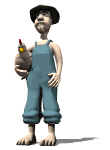 A farmer got so old that he couldn’t work the fields anymore. So he would spend the day just sitting on the porch. His son, still working the farm, would look up from time to time and see his father sitting there. "He’s of no use any more," the son thought to himself, "he doesn’t do anything!"
A farmer got so old that he couldn’t work the fields anymore. So he would spend the day just sitting on the porch. His son, still working the farm, would look up from time to time and see his father sitting there. "He’s of no use any more," the son thought to himself, "he doesn’t do anything!"
One day the son got so frustrated by this, that he built a wood coffin, dragged it over to the porch, and told his father to get in. Without saying anything, the father climbed inside. After closing the lid, the son dragged the coffin to the edge of the farm where there was a high cliff. As he approached the drop, he heard a light tapping on the lid from inside the coffin. He opened it up. Still lying there peacefully, the father looked up at his son. "I know you are going to throw me over the cliff, but before you do, may I suggest something?" "What is it?", replied the son. "Throw me over the cliff, if you like," said the father, "but save this good wood coffin. Your children might need to use it."
Here we see a subtle suggestion to the Law of Karma: If you throw your father in a coffin over the cliff, it may be that in that same coffin your children may throw you too.
A comment from a reader of the story: "This story reminds me of when my father was in a depression. But we didn’t throw him over a cliff. The family pulled together and helped him recover."
Back
![]()
Unknown Author
(Original text in Spanish, translation.)
 The master walked with his disciples. He taught using questions full of content, riddles that kept within a whole wisdom of life. And he always surprised his disciples with his wise teachings.
The master walked with his disciples. He taught using questions full of content, riddles that kept within a whole wisdom of life. And he always surprised his disciples with his wise teachings.
On certain occasion, while dusking, he asked his disciples if they knew how to tell when the night ended and the day started.
The first of them said:
—When you see an animal at the distance and you can distinguish if it is a cow or a horse.
—No —said the master.
—When you see a tree at the distance and you can distinguish if it is a pine or an eucalyptus.
—Not either —said the master.
—It’s OK —said the disciples—, tell us, when is it?
—When you look at a man at his face and recognize in him your brother; when you look at the face of a woman and recognize in her your sister. If you’re not able to do this, then, be whatever hour it be, still it’s night for you.
Back
![]()
Unknown Author
The man whispered, "God, speak to me" and a meadowlark sang. But the man did not hear.
So the man yelled, "God, speak to me" and the thunder rolled across the sky. But the man did not listen.
The man looked around and said, "God, let me see you." And a star shined brightly. But the man did not see.
And the man shouted, "God, show me a miracle." And a life was born. But the man did not notice.
So, the man cried out in despair, "Touch me, God, and let me know you are here." Whereupon God reached down and touched the man. But the man brushed the butterfly away… and walked on.
I found this to be a great reminder that God is always around us in the little and simple things that we take for granted … even in our electronic age … so I would like to add one more:
The man cried, "God, I need your help!" And an e-mail arrived reaching out with good news and encouragement. But the man deleted it and continued crying…
Don’t miss out on a blessing because it isn’t packaged the way that you expect.
Back
![]()
Unknown Author
(Original text in Spanish, translation.)
An old and very poor man was dedicated to sow mango trees. Somebody said to him:
— How come at your age you dedicate to plant mangoes? Have it for sure that you won’t live long enough to consume their fruits!
Peacefully the old man responded:
—All my life I have eaten mangoes from trees sown by others. May mine yield fruits for those who survive me!
We inhabit a splendid universe in which everything and all of us have something to offer. The trees give, the rivers give, the land gives, the sun and the moon and the stars give. How come, then, this anxiety to take, receive, amass, gather, accumulate, without giving anything in return? We all can give something, no matter how poor we are. We can offer pleasant thoughts, sweet words, radiant smiles, touching songs, a firm hand and so many other things that alleviate a wounded heart.
More than money, what the world needs is love… and affection.
Back
![]()
From the Spanish version of "Who Can Make It Dawn?" ("¿QUIEN PUEDE HACER QUE AMANEZCA?"), written by Anthony de Mello, S.J.
—All word and all image that is employed to refer to God have more of falsification than of description.
—Then, how can be spoken of God?
—By means of silence.
—And if that’s the case, why do you speak with words?
The master could not avoid laughing heartily, and said:
—When I speak, you should no listen to the words. Listen to the silence.
Back
![]()
Unknown Author
(Original text in Spanish, translation.)

![]()
Unknown Author
(Original text in Spanish, translation.)
Four pilgrims gathered togetherto peregrinate to India: a Persian, a Turk, a Greek and an Arab. The four pilgrims were resting by the shore of a river when there passed by a religious man, who, seeing that they were pilgrims, offered them some rupees so that they could get breakfast.
When the man had departed, the Persian said: "With this money I am going to buy angur so that we all can eat". The Turk protested: "No way, we will buy unzum", but the Greek replied bluntly: "Nothing of that; we’ll buy stafyllia", while the Arab intervened to affirm: "We’re going to buy inab".
At that moment all started to argue and even exasperated they turned to hit each other. But other peaceful pilgrim passed by there and tried to appease ad reconcile them. "What is going on among you, good friends?" When they explained to him what’s happening, the man said: "Give me your money. I will go to the marketplace and will satisfy all of you." He departed and, a little later, came back bringing a package with great amount of grapes. When the Persian saw them he exclaimed: "My angur!", and the Turk: "My unzum!", and the Greek: "My stafyllia!", and the Arab: "My inab!"
Back
![]()
Unknown Author
(Original text in Spanish, translation.)
 If you feel that life has no sense, that problems are finishing you, memorize this parable:
If you feel that life has no sense, that problems are finishing you, memorize this parable:
"A bird that lived resigned in a rotten tree in the midst of a marsh was accustomed to be there, he ate worms of the slime, and always was dirty by the pestilent mud.
"His wings were unusable by the weight of the grime until certain day a gale destroyed his den, the rotten tree was swallowed up by the muck and he realized that was going to die.
"In a sudden desire to save himself he started to flap its wings forcefully to start the flight, it cost him so much work because he had forgotten how to fly but he faced the pain of the numbness until he was able to raise and to cross the wide sky finally arriving to a fertile and beautiful forest."
Problems are as the gale that had destroyed your den and are obliging you to take flight or die.
Never is late. It does not matter what you have lived, nor the errors that you have made, it does not matter the opportunities you have left pass, nor age, we are always on time to say STOP, to listen to the call that we have to look for perfection, to shake off the muck and to fly high and very far away from the marsh.
Abandon the safety and comfortable life. Rush into an uncertain route, full of enigmas and insecurities, and do it alone.
God will give you company and will tell you what path to take.
Back
![]()
Unknown Author
(Original text in Spanish, translation.)
 In the Indian world one of the principles that constitute the universe is pain, however the eyes of that people penetrate in this reality without fear and transform it in something sublime.
In the Indian world one of the principles that constitute the universe is pain, however the eyes of that people penetrate in this reality without fear and transform it in something sublime.
This story tells that a warrior looked at his newly-born daughter, so beautiful she looked to him, that he could not find an appropriate name for her.
He decided to look for the most valuable of the world and to take it as a name for his first-born. He left early to walk and thought he could call her "Silence", since it is beautiful… but when started to dawn, the warrior stopped and said: No, I’ll call her "Dawn".
He continued walking and visiting friends and thus he was changing his election for the name of his little one: Light, Snow, Butterfly, Dove…
He found the most wise of the Indians who oriented him to go behind the mountain to the home of a very humble shepherd and he said: "There you will find what you’re looking for."
The warrior waited outside the dwelling and he saw a girl coming out, he felt a chill since she was covered with Leprosy, something all feared.
Some minutes passed… he heard the voice of the shepherd calling his daughter and both approached each other and the rude warrior saw how they embraced and covered with kisses.
He returned to his home with tears in his eyes and he said: "I’ll call her Heoma-nae-san ["Love in Pain"]."
Yes, friends, this is the greatest love, the one given when a person has nothing material, when he or she is sick of the body or the soul, when we feel the imperious need to alleviate suffering of a loved one even to the risk of our own life.
Back
![]()
Unknown Author
(Original text in Spanish, translation.)

One night a group of nomads were getting ready to sleep when suddenly were surrounded by a light. They understood they were in the presence of a celestial being and with great anxiety they hoped for a divine message of great importance that they knew would have to be special for them.
Finally a voice was heard that told them:
—Gather all the pebbles you find on the floor and put them in your saddlebags, tomorrow you travel all day long, that way the night will find you happy but sad…
Before saying goodbye the nomads shared their deception and upset. They hoped for the revelation of a great universal truth that will allow them to generate wealth, health and purpose for the world. But what they had received was instead an insignificant task, "lacking sense" to them. However, the remembrance of the splendor of the visitor made each of them gather some pebbles and deposit them in their saddlebags, not without expressing their discontent.
They traveled all day long and that night, when they assembled the tent, they checked their saddlebags and found that each pebble had turned into a diamond. They were content for having the diamonds but sad for not gathering many more pebbles.
That’s it:Life is full of so many things "lacking sense", that we do not give the importance they have. A word, an embrace, a kiss, a smile, a handshake, a caress, a flower, a greeting, an I love you, a wink, a thank you, they look like pebbles, but they are really diamonds!
Back
![]()
Unknown Author
(Original text in Spanish, translation.)
Two friends were walking and at a determined point of their trip they discussed strongly, and because of anger one offended the other, with unjustified insults. The other, offended, having nothing to say, wrote on the sand: "Today, my best friend offended me.". They continued ahead and arrived to an oasis where they decided to take a bath. The offended one started to drown, and his friend saved him.
When he recuperated he took the stylus and wrote on a stone: "Today, my best friend saved my life". Intrigued, the friend asked: "Why after I insulted you, you wrote on the sand and now instead you write on a stone?"
Smiling the other friend answered: "When a friend offend us, we should write on the sand, where the wind of forgetfulness and forgiveness will be in charge of erase it and turn it off. But when he helps us, we should engrave it on the stone of the heart memory, where no wind will be able to erase it."
Back
![]()
From the Spanish version of "Who Can Make It Dawn?" ("¿QUIEN PUEDE HACER QUE AMANEZCA?"), written by Anthony de Mello, S.J.
The Master said to a disciple that lamented of his own limitations:
—Of course you are limited. But, have you not realized that today you can do things that fifteen years ago would have seemed impossible to you? What is it that has changed?
—My talents have changed.
—No. You have changed.
— And, is it not the same?
—No. You are what you think you are. When your way of thinking changes, you change.
Back
![]()
From the Spanish version of "Who Can Make It Dawn?" ("¿QUIEN PUEDE HACER QUE AMANEZCA?"), written by Anthony de Mello, S.J.
— What is love?
—The total absence of fear —said the Master.
— And what is that we have fear of?
—To love —answered the Master.
Back
![]()
![]() Don’t Judge Others Because They Are Different
Don’t Judge Others Because They Are Different
Unknown Author
(Original text in Spanish, translation.)
A man was placing flowers at the tomb of a relative when he sees a Chinese putting a dish of rice at the neighboring tomb. The man addresses the Chinese and asks him:
—Excuse me, Sir, but, do you truly believe that the diseased will come to eat the rice?
—Yes, —answers the Chinese— when yours comes to smell your flowers…
Moral: Respecting other’s opinions is one of the greatest virtues that a human being may have. People are different, act different and think different. Do not judge, only try to understand.
Back
![]()
Unknown Author
 A flock of eagles was pecking seed on a farmer’s land. Since the farmer threw them food every day, they stayed on the farm day after day, month after month. A wise old eagle flew by and saw his friends.
A flock of eagles was pecking seed on a farmer’s land. Since the farmer threw them food every day, they stayed on the farm day after day, month after month. A wise old eagle flew by and saw his friends.
—Why are you on the ground?
—The human feeds us and we have no need to go any place else, they replied.
—But you are eagles and have forgotten how to fly. Your realm is in the sky, not on the ground. Let me free you.
The physical conditioning of our sensual pleasures ties us to this earthly plane. We have forgotten that we are not physical but Light Bodies. We can fly. We can escape our conditioned existence, our hypnotized state.
Back
![]()
![]() Things Are Not Always As They Appear to Be
Things Are Not Always As They Appear to Be
Unknown Author
(Original text in Spanish, translation.)
Editor’s Note: The spiritual principle contained in this story is also in another different story you will find at: How Do You Know?
 Two traveling Angels stop to spend the night in a home of a very wealthy family. The family was rude and did not want to allow the Angels to stay in the guess room of the mansion. Instead of that, the Angels were given a small space in the cold basement of the house. As they prepared their beds on the hard floor, the older Angel saw a hole on the wall and he repaired it. When the younger Angel asked why?, the older Angel answered him, "Things are not always as they appear to be."
Two traveling Angels stop to spend the night in a home of a very wealthy family. The family was rude and did not want to allow the Angels to stay in the guess room of the mansion. Instead of that, the Angels were given a small space in the cold basement of the house. As they prepared their beds on the hard floor, the older Angel saw a hole on the wall and he repaired it. When the younger Angel asked why?, the older Angel answered him, "Things are not always as they appear to be."
The next night the couple of angels came to rest in the house of a man and his wife, very poor, but the man and his wife were very hospitable. After sharing the small food that the family had, the couple allowed the Angels to sleep in their bed where they could have a good night rest.
When dawned, the next day, the Angels found the man and his wife covered in tears. The only cow they had, whose milk had been their only income, laid dead in the field. The younger Angel was furious and asked the older Angel: "How could you allow this would have happened? The first man had all, however you helped him"; the younger Angel accused him. "The second family had very little, but was willing to share everything, and you allowed the cow die."
" ‘Things are not always as they appear to be,‘" replied the older Angel. "When we were in that basement of the immense mansion, I noticed that there was gold stored in that hole in the wall. Since the owner was so obsessed with avarice and not willing to share his god fortune, I sealed the hole, so that he would never find it."
"Then, last night when we slept in the bed of the poor family, the angel of death came looking for the wife of the farmer. And I gave him the cow instead. ‘Things are not always as they appear to be.‘"
Sometimes, that is exactly what happens when things do not come out as one expects them to come out. If you have faith, only need to trust that come what may, they will always be for your advantage. And you would know this until a little later.
Back
![]()
Angelluz 2003
(Original text in Spanish, translation.)
Excerpt.
An expert was given a lecture to a group of professionals. To make a point clear, he utilized an example the professionals never forgot. Standing in front of the very successful audience he said:
—I want to make you a little exam…
From under the table he took a glass jar of wide opening and put it on the table in front of him.
Then he pulled out a dozen rocks of the size of a fist and started to place them one by one in the jar. When the jar was full to the brim and he could not put more rocks he asked the audience:
—Is this jar full?
All the attendants said: Yes!
Then he said:
—Are you sure?, and he took out from under the table a bucket of small pebbles. He put some of the stones in the jar and shook it to make sure the small rocks would accommodate in the empty space between the big ones.
When he had done this he asked once more:
—Is the jar full?
This time the audience already supposed what was coming and one of the attendants said in a loud voice:
—Probably not.
—Very well, answered the exponent.
He took out from under the table a bucket full of sand and started to pour it in the jar. The sand accommodated in the space between the big and small stones. Once more he asked to the group:
—Is the jar full?
This time several persons responded in chorus:
—No!
Once more the expositor said:
—Very well!, then he took out a pitcher full of water and poured the water in the jar until filling it. When he finished, he looked at the audience and asked:
—What do you think is the teaching of this small demonstration?
One of the spectators raised the hand and said:
—The teaching is that no matter how full is our schedule, if truly you try, you’ll always be able to add more things…
—No, replied the exponent, that is not the teaching. In truth this demonstration teaches us that if you do not put the big stones first, you will not be able to put them in any other moment. Which are the big stones in your life?,… your family, your faith, your education or your finances?, some cause you want to support?, to teach what you know to others? Remember to put those big stones first or you’ll not find a place for them. Take your time to clarify which are your priorities and revise how you use your time so no one be left outside, or what is worst, you be forced to take out a big stone to be able to put in sand.
When you accommodate priorities in your life and dedicate them a time of your time, these onesare sufficient for everything.
Back
![]()
Unknown Author
(Original text in Spanish, translation.)
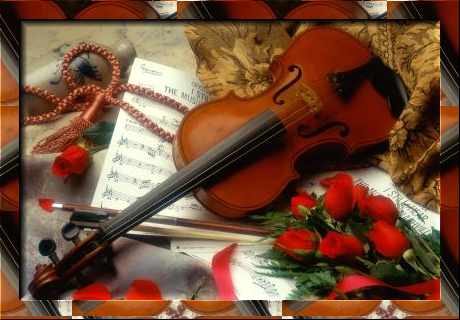 This story is about a man that reflected defeat by his way of dressing, and total mediocrity, by his way of acting.
This story is about a man that reflected defeat by his way of dressing, and total mediocrity, by his way of acting.
It happened in Paris, in a centric street although secondary. This man, dirty and smelly, played an old violin. Before him and on the floor he placed his beret, with the hope that the passers-by had pity of his condition and threw some coins to take home.
The poor man tried to bring forth a melody, but it was impossible to identify it at all due to the out of tune of the instrument, and the unpleasant and boring way he played that violin.
A famous concert performer, who along with his wife and some friends was coming out of a nearby theater, passed in front of the musical beggar. All wrinkled the face to hear those so discordant sounds. And could not help but laugh heartedly.
The wife asked the concert performer to play something. The man took a look at the few coins inside the beret, and decided to do something.
He requested the violin. And the musical beggar lent it with certain reticence.
The first the concert performer did was to tune its strings. And then, vigorously and with great mastery he drew a fascinating melody from the old instrument. His friends started to applaud and the passers-by started to gather around to see the improvised spectacle.
After listening to the music, people of the nearby main street came too and soon there was a small multitude listening in rapture to the strange concert. The beret got full not only of coins, but of many bills of all denominations, while the maestro played melody after melody, with so much joy.
The musical beggarwas even happier to see what was going on, and did not cease to jump up and down in joy and proudly reaping to all: "That is my violin!!, That is my violin!!".Which is, of course, rigorously true.
In life we all have "a violin". It is our knowledge, our abilities and our attitudes.And we have the absolute freedom to play "that violin" as we please.
It was said to us that God concede upon us free will, say, the faculty to decide what we will do with our life. And this, of course, is both a marvelous right, as well as, a formidable responsibility.
Some, by laziness, not even tune that violin. They do not perceive that in the present world you have to prepare yourself, learn, develop abilities and constantly improve attitudes if we want to perform a good concert.
They want a beret full of money, and what they deliver is a discordant melody that nobody likes. That is the people who do their job in the form: "here it goes…" Who think in terms of "it costs me…", and that believe that humanity has an obligation to pay for their bad performance, covering all their needs. It is the people that think only of their rights, but feel no obligation to own them.
Truth, as harsh as it may seem to us, is otherwise. You and I, and any other person, have to learn sooner or later, that the best places are for those that not only tune well that violin, but who learn over time to play it with mastery too. That is why we are willing to do well in our daily job, whatever it may be. And to always aspire to prepare ourselves to be able to accomplish other things we would like.
History is full of examples of people that even with initial difficulties became good concert performers with their violins (their lives). And also, unfortunately, it registers cases of many others, that having great opportunities, decided with that violin, to become music beggars.
The truth is that God bestowed upon us "free will". You can do something great with your life, or make of it a misery. That is your personal decision.
And to add something more to the story, I want to bring good news. If someone, for diverse reasons, be whatever they may be, is no longer able to tune his or her own "violin", I can assure you that likewise that famous violinist tuned the beggar’s violin, God is in the best disposition to tune and play harmonious melodies of your life. He is as close to you as the word that comes out of your mouth, but in the depth of your heart, expressing your need, and desire to change.
God loves you and wishes the best for you.
Back
![]()
![]() We Can Only Bring Love In the Heart
We Can Only Bring Love In the Heart
Unknown Author
(Original text in Spanish, translation.)
In one of the schoolrooms of a school there were several children. One f them asked:
—Teacher,what is love?
The teacher felt that the little one deserved an answer that would be up to the intelligent question she had formulated. Since they were already in recess time, she asked her students that they went around the school patio and brought with them what more awaken in them the feeling of love.
The children rushed out and, when returned, the teacher told them:
—I want each one of you to show me what you bring with you.
The first student answered:
—I brought this flower, isn’t it pretty?
When his turn came, the second student said:
—I brought this butterfly. See the color of her wings;I am going to place it in my collection.
The third student added:
—I brought this little pigeon that fell from the nest,brother:isn’t it funny?
 And so on the little ones, one by one, were placing on the table what they had picked up from the patio.
And so on the little ones, one by one, were placing on the table what they had picked up from the patio.
After finished the exposition, the teacher noticed that one of the girls had brought nothing, and remained quite all the time. She was feeling ashamed because she had not brought anything. The teacher turned to her and askedher:
—Very well, and you?Have you gotten anything?
The little one, timidly, answered:
—Excuse me, teacher.I saw a flower and felt its perfume;I thought to pull it up but preferred to leave it so it would give off its aroma for more time.I saw the butterfly, soft, colorful, but it looked so happy that I did not have the courage to imprison it. I also saw the little fallen pigeon among the leaves, but … when climbing the tree, I noticed the sad look of his mother and preferred to return it to the nest. Therefore, teacher, I bring with me the flower perfume, the sensation of freedom of the butterfly and the gratitude I observed in the eyes of the birdie’s mother. How can I show you what I brought?
The teacher thanked the student and gave her the highest grade, considering that she had been the only one who was able to perceive that we "can only bring love in the heart."
You know, this was sent to me by someone who taught me that love is not: To Take, To Pull Up, To Force, to Win or To Lose.
Love is carried in the soul,… it is Remembering, … it is Enjoying. To Love is…to be Free and … to let be Free.
Back
![]()
Unknown Author
(Original text in Spanish, translation.)

 A group of salesmen went to a sales convention. All had promised their wives they would arrive at time for dinner Friday night. However, the convention ended a little late, and they came tardy to the airport. They all came in with their tickets and portfolios, running through the ails. Suddenly, and unintentionally, one of the salesmen stumbled on a table that had an apple basket. The apples went flying everywhere. Without stopping, nor turning back, the salesmen continued running, and barely were able to get on the plane. All but one.
A group of salesmen went to a sales convention. All had promised their wives they would arrive at time for dinner Friday night. However, the convention ended a little late, and they came tardy to the airport. They all came in with their tickets and portfolios, running through the ails. Suddenly, and unintentionally, one of the salesmen stumbled on a table that had an apple basket. The apples went flying everywhere. Without stopping, nor turning back, the salesmen continued running, and barely were able to get on the plane. All but one.
This one stopped, took a deep breath, and experienced a feeling of compassion for the owner of the apple booth. He said to his friends that continue without him and asked one of them that when he arrived call his wife and explain to her that he was coming in a later flight. Then he returned to the terminal and found all the apples thrown on the floor. His surprise was great, when realizing that the owner of the booth was a blind girl. He found her crying, with big tears running down her cheeks. She groped on the floor, trying, in vain, to collect the apples, while the multitude passed by, vertiginous, non stopping,without caring for her misfortune.
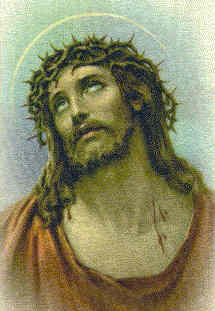 The man knelt down with her, he gathered the apples, put them in the basket and helped her to setup her booth again. While he did it, he realized that many apples had been beaten and they were bruised. He took them out of the basket and put them in another basket. When he finished, he pulled out his purse and told the girl: "Please, take these one hundred pesos for the damaged we did to you. Are you OK?". She, crying, nodded positively. He continued telling her: "I hope I have not ruined your day." As the salesman was going away, the girl cried loud at him: "Sir…" He stopped and turned around to see those blind eyes. She continued: "Are you Jesus…?"
The man knelt down with her, he gathered the apples, put them in the basket and helped her to setup her booth again. While he did it, he realized that many apples had been beaten and they were bruised. He took them out of the basket and put them in another basket. When he finished, he pulled out his purse and told the girl: "Please, take these one hundred pesos for the damaged we did to you. Are you OK?". She, crying, nodded positively. He continued telling her: "I hope I have not ruined your day." As the salesman was going away, the girl cried loud at him: "Sir…" He stopped and turned around to see those blind eyes. She continued: "Are you Jesus…?"
He stopped abruptly and swirled several times, before heading to board another flight, with that question burning and vibrating in his soul:"Are you Jesus?"
… And to you, are people mistake you for Jesus? Because that is our destiny, isn’t it? To resemble ourselves so much to Jesus that people cannot see the difference. To look so much like Jesus, as we live in a world that is blind to His Love, His Life and His Grace. If we say we know Jesus, we should live and act as he would. To know him is much more that to cite the Gospels and to go to church. It is, really, to live His word each day.
You are the apple of His eyes, even though you have been bruised by the falls. He left all and gathered you and me in Calvary;He paid for our spoilt fruit. Let’s start to live as though we were worthy of the price He paid!
Back
![]()
Luis Alberto Mecklenburg. Original title: "To Age Is Mandatory, To Mature Is Optional" ("Envejecer Es Obligatorio, Madurar Es Optativo.")
(Original text in Spanish, translation.)
I strolled with my father when he stop at the corner and after a small silence he asked:
— Besides the bird singing, do you hear anything else?
I sharpened my ears and some seconds later I answered him:
—I’m hearing the noise of a cart.
—That’s right —said my father—.It’s an empty cart.
I asked my father:
—How do you know it’s an empty cart, if we cannot see it yet?
Then my father answered:
—It’s very easy to know when a cart is empty,…by the noise. The emptier the cart, the noisier it is.
I became an adult and today when I see a person speaking too much, interrupting everybody’s conversation, being importune or violent, showing off what he has, feeling prepotent and looking down at people, I have the impression of hearing the voce of my father saying: "The emptier the cart, the noisier it is."
Humbleness consists of keeping quiet our virtues and letting others discover them.
Back
![]()
![]() Why People Yell At Each Other?
Why People Yell At Each Other?
Unknown Author
(Original text in Spanish, translation.)
A sage asked his mandalies the following:
— Why people yell at each other when they are upset?
The men thought for a while:
—Because we loose our calmness —said one—we yell for that.
—But, why to yell when the other person is at your side? —asked the sage—. Isn’t it possible to speak to him or her with a soft voice? Why do you yell at a person when you’re angry?
The men gave some other answers but none satisfied the sage. Finally he explained:
—When two people are angry at each other, their hearts distance a lot. To cover that distance they must yell, to be able to hear each other. The angrier they are, the stronger they will have to yell to hear each other through that great distance.
Then the sage asked:
— What happens when two people fall in love?,they do not yell at each other but talk softly, why? Their hearts are very close.The distance between them is very small.
The sage continued:
—When they love each other even more, what happens? They do not speak, only whisper and they get even closer to each other in their love. Finally they even need not whisper, they only look at each other and that’s all. That is how close two people are when they love each other.
Then the sage said:
—When you argue do not let your hearts get distant, do not say words that distance each other more, it will come a day when the distance be so great that you will not find the path to return.
Back
![]()
Madeleine E. Belliard. Excerpt from her book "Awakening to the New Consciousness" ("Despertando a la Nueva Conciencia"), available in Spanish.
(Original text in Spanish, translation.)
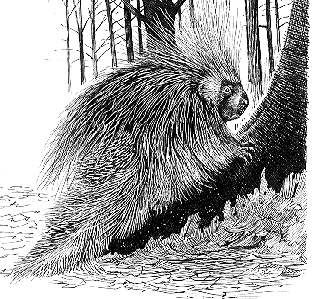 During the Glacial Age, many animals died of cold. The porcupine, noticing this situation, agreed to live in groups; this way they gave warmth and protected each other.
During the Glacial Age, many animals died of cold. The porcupine, noticing this situation, agreed to live in groups; this way they gave warmth and protected each other.
But the thorns hurt the closest neighbors, just those that gave them warmth. And because of that, they separated from each other.
But they felt cold again and had to take a decision:either they disappear from the face of the earth or they accept the thorns of their neighbors. With wisdom, they decided to go back and live together.
They learned thus to live with the small wounds that a close relationship could make, because what was really important was the warmth of the other. And in so doing they survived.
The best relationship is not that which unites perfect people, but that one where each one accepts the defects of others and forgives their own. I want to live each day with optimism and kindliness carrying around a heart full of comprehension, love and peace;and even though I make mistakes, I want to know that those are repairable…to know that you forgive me and I forgive myself, but not superficially, but rather from the deepest depth.
We are humans and we tend to wrong on occasions, but what counts is to overcome these and all other obstacles that are presented before us each step in life. If we close ourselves to a complete forgetfulness of our faults (say, those who affirm they forgive, but do not forget)we are allowing pride to take the reins of our lives and with it we are opening the doors to resentment since each time we remember the incident we come back to feel the low vibrations that this one produced when it happened. That is why forgiveness and forgetting are Siamese brothers, it is impossible one exists without the other.
Many things in our surroundings would heal faster if we, truly, let go of resentment, hate, pride, anger, and selfishness. Each one of them silently stop us of our evolution. The Little Prince used to repeat unceasingly: "I am responsible for my Flower" and we are that prince that Saint Exupreydescribes in his famous work….Also we are responsible for our own flower and to take care of it we must overcome these obstacles called hate, anger, selfishness and resentment. Perhaps you think that is difficult, nobody has said that it won’t be, but Confucius said that a thousand steps start with the first one and certainly to walk so much isn’t easy;what is important is to start and then, without looking back, to continue no matter if the road turnsrough on occasions. The mishaps make us strong and there is a refrain that says that there is no illness that lasts a thousand years neither body who can stand it;let’s say we all have the internal capacity to excel ourselves and to be better each time. Knowing this we must be consequent in our determination to improve, to forgive and to overcome these "small or "big" things that daily happen to us;after all, life would be too boring if we had not what to do in it.
Back
![]()
Unknown Author
(Original text in Spanish, translation.)
A university student came out one day and went for a stroll with a professor whom the students considered a friend due to his kindliness for those who followed his instructions. While walking, they saw on the path a pair of old shoes and they assumed belonged to an old man that worked in the neighboring field and who was near to finish his daily labor.
The student told the professor:
—Let’s play a prank on him. Let’s hide his shoes and we hide ourselves behind those bushes to see his face when he cannot find them.
—My dear friend —said the professor—we should never have fun at the expense of the poor. You are rich and can give a joy to this man. Place a coin in each shoe and then we hide to see how he reacts when he finds it.
That he did and both hid among the nearby bushes. The poor man finished his tasks and crossed the terrain searching for his shoes and coat. When he put on his coat he slid his foot in the shoe but when he felt something inside, he bent down to see what it was and found the coin. Flabbergasted he asked himself what could have happened. He watched the coin and watched it again. Then he looked around, to all sides, but did not see anybody. He put it in his pocket and put on the other shoe; his surprise was double when he found the other coin.
His feelings overwhelmed him. He fell on his knees and raised his sight to heaven pronouncing a fervent thankfulness in loud voice, speaking of his sick wife and without help and of his children that did not have food and that due to an unknown hand they would not starve to death.
The student was profoundly affected and his eyes welled with tears.
—Now —said the professor— aren’t you morepleased than if you would have played a prank?
The youth answered:
—You have taught me a lesson that I will never forget. Now I understand something that before I did not: IT IS BETTER TO GIVE THAN TO RECEIVE.
Back
![]()
Unknown Author
(Original text in Spanish, translation.)
 Once upon a time an old man had lost his wife and lived by himself. He had worked so hard as a tailor all his life, but misfortunes had left him in bankruptcy, and now he was so old that was unable to work.
Once upon a time an old man had lost his wife and lived by himself. He had worked so hard as a tailor all his life, but misfortunes had left him in bankruptcy, and now he was so old that was unable to work.
His hands trembled so much that he could not thread a needle, and his vision hadturn too cloudy to do a straight seam. He had three male children, but the three of them had grown up and had married, and were so busy with their own lives that only had time to get dinner with their father once a week.
The old man was weaker and weaker, and his children visited him less and less.
—They do not want to be with me now —he said to himself—because they’re afraid that I become a burden to them.
He passed a night without sleeping thinking what would be of him and finally he devised a plan. The next morning he went to see his friend the carpenter and asked him to fabricate a big coffer. Then he went to see his friend the locksmith and asked him to give him an old bolt and lock. Finally he went to see his friend the glassmaker and asked him for all the fragments of broken glass he had.
![]() The old man took the coffer home and filled it to the brim with broken glass, he locked it up and put it underneath the kitchen table. When his children went to dine with him, they touched it with their feet.
The old man took the coffer home and filled it to the brim with broken glass, he locked it up and put it underneath the kitchen table. When his children went to dine with him, they touched it with their feet.
—What is in that coffer?,they asked looking under the table.
—Oh, nothing —answered the old man—,only some little things I have saved.
His children pushed it and saw that it was too heavy. They kicked it and heard a clinking.
—It must be full with the gold he saved along his years —they whispered.
They deliberated and understood they should guard the treasure.They decided to take turns to live with the old man, and thus they could take care of him too. The first week the younger son moved into the father’s home, and took care and cooked for him. The following week he was replaced by the second son, and the next week came the oldest one. Thus they continued for a time.
Finally the old father got sick and died.
The sons made for him a nice funeral, because they knew that a fortune was awaiting under the kitchen’s table, and they could afford a big expense with the old man. When the ceremony ended, they looked around the house until they found the key and opened the coffer. Of course, they found it full of broken glass.
—What a wicked trick! —exclaimed the oldest son—.What a cruelty towards his children!
—But, what could he do? —asked sadly the second son—.Let’s be frank. Were not for the coffer, we could have neglected him until the end of his days.
—I am ashamed of myself —wept the younger son—.We forced our father to lower himself to deceitfulness, because we did not observe the commandment he taught us when we were little. But the oldest son tipped over the coffer to be sure that there were not any object of value hidden among the glass. He scattered the glass on the floor until he emptied the coffer.
The three brothers looked silently inside, where they read an inscription that the father had left for them at the bottom:
"Honor thy father and thy mother."
Back
![]()
Unknown Author
(Original text in Spanish, translation.)
Two brothers, one single and the other married,had a farm whose fertile soil produced abundant grain that both brothers shared at equal parts.
At the beginning everything was going perfectly. But it came a moment when the married brother every night started to awake up startled thinking: "It’s unjust. My brother who is unmarried takes half the crop;but I have a wife and five children,so in my old age I will have all I need. Who will take care of my poor brother when he be old?He needs to save for the future more than what presently saves because his need is, evidently, more than mine."
Then he stood up from bed, went secretly to his brother’s place and poured in his brother’s granary a sack of grain.
Also his bachelor brother started to awake up at night and say to himself: "This is an unjust. My brother has a wife and five children and he takes half of the crop. But I do not have to maintain anybody more than myself. Is it just, perhaps, that my poor brother, whose need is greater than mine, receive the same as myself?"
Then he stood up from his bed and carried a sack of grain to his brother’s granary.
One day both stood up from bed at the same time and run into each other, each one with a sack of grain on their back.
Many years later, when both already had died, the fact was divulged. And when the citizens decided to erect a temple, they chose for this the place in which both brother had found each other because they did not believe there were a holier place than that in all the city.
The true religious difference is not the difference between those who do worship and those who don’t,but between those who love and those who don’t.
Back
![]()
Unknown Author
(Original text in Spanish, translation.)
A highly uncultured peasant, of advanced age, comes to the doors of a monastery. When they open them, he explains himself like this:
—Friendly monks, I am a man with a lot of faith. I want to receive teachings.
The monks talk among themselves, at the side of the newly arrived. When they verify his lack of culture, they think that he is not able to receive teachings and much less methods of self-development, but since he seems a man of faith, they tell him:
—Look, good man, you are going to be in charge of sweeping the monastery every day. You may stay here and will have room and board.
Months after, the monks start to see that each day the peasant is found more tranquil, with a semi-smile always drawn on his lips and a special shining in his eyes. He exhale true tranquilityand is seen happy and balanced. It is so that the monks, bewildered, ask him:
—Good man, it looks that during these months you have undergone a great spiritual evolution. Are you practicing any special method?
And the man answers:
—Brothers, the only thing I do, with a lot of attention, clarity and love, is to sweep the monastery. I put all my vigilance and precision in that one too, when sweeping the garbage I think that I am sweeping from myself the rancor, deceptions, greed and hatred. And each day I am happier.
Back
![]()
From the Spanish version of "Who Can Make It Dawn?" ("¿QUIEN PUEDE HACER QUE AMANEZCA?"), written by Anthony de Mello, S.J.
The owner of an amusement park was talking of the irony of the fact that, while the children were enjoying big time in his park he was, for the most part, depressed.
—Would you rather be the park owner or to have fun?,asked him the Master.
—Both things.
The Master did not say a single word anymore. When, later, was asked in this regard, the Master limit himself to quote the words that a vagabond addressed to a rich landowner:
—You own the property. Others enjoy the landscape.
Back
![]()
Roger Walsh, "Essential Spirituality", John Wiley & Sons, 1999
A pupil asked a great teacher, "How do I find wisdom?" The teacher answered, "By good choices." "And how do I make good choices?", asked the pupil. "From experience", said the teacher. "And how do I get experience?", asked the student, "From bad choices", said the teacher.
Back
![]()
Unknown Author
(Original text in Spanish, translation.)
Onceupon a time there was a king who offered a great prize to that artist who could capture in a picture the perfect peace.
Many artists tried. The king observed and admired all the pictures, but only there were two that he really liked and he had to choose one of them.
The first one was a very peaceful lake. This lake was a perfect mirror where some placid mountains that surrounded it were reflected. Above them was found a sky of pure blue with tenuous white clouds. All who saw this painting thought that this one reflected the perfect peace.
The second painting also had mountains. But these ones were open and rugged. On them there was a furious sky from which fell a impetuous downpour with thunder and bolts. Downhill seemed to resound a foamy torrent of water. All of this did not reveal in the least the peacefulness. But when the king observed carefully, he saw through the cascade a delicate bush growing in a rock crevice. In this bush was found a nest. There, in the midst of the roaring of the violent water fall, was placidly sat a little bird in the middle of its nest…perfect peace.
The king chose the second one. Do you know why?because, the king explained, "Peace does not mean to be in a place without noise, without problems, without hard work and without pain. Peace means that despite of being in the midst of all these things we remain calm within our heart. This is the true meaning of peace.
Back
![]()
Unknown Author
 On the first day God created the dog.
On the first day God created the dog.
God said, "Sit all day by the door of your house and bark at anyone who comes in or walks past. I will give you a life span of twenty years."
The dog said, "That’s too long to be barking. Give me ten years – you can keep the other ten." So God agreed.
 On the second day, God created the monkey.
On the second day, God created the monkey.
God said, "Entertain people, do monkey tricks, make them laugh. I’ll give you a twenty-year life span."
The monkey said, "How boring, monkey tricks for twenty years? I don’t think so. Dog gave ten years back to you, so that’s what I’ll do too, okay?" And God agreed.
 On the third day, God created the cow.
On the third day, God created the cow.
God said, "You must go to the field with the farmer all day long and suffer under the sun, have calves and give milk to support the farmer. I will give you a life span of sixty years."
The cow said, "That’s kind of a tough life you want me to live for sixty years. Let me have twenty and you can keep the other forty." And God agreed again.
 On the forth day God created man. God said, "Eat, sleep, play, marry and enjoy your life. I’ll give you twenty years."
On the forth day God created man. God said, "Eat, sleep, play, marry and enjoy your life. I’ll give you twenty years."
Man said, "What? Only twenty years! Tell you what, I’ll take my twenty, and the forty the cow gave back and the ten the monkey gave back and the ten the dog gave back, that makes eighty, okay?" "Okay," said God, "You’ve got a deal."
So that is why the first twenty years we eat, sleep, play, and enjoy ourselves; for the next forty years we slave in the sun to support our family; for the next ten years we do monkey tricks to entertain the grandchildren; and for the last ten years we sit on the front porch and bark at everyone.
Life has now been explained to you.![]()
Back
![]()
Unknown Author
(Original text in Spanish, translation.)
A university professor challenged his students with this question: "Did God create all that exists?"
A student answered valiantly: "Yes, He did".
|
|
|
School class photograph in Munich, 1889. Einstein is in the front row, second from right. He did well only in mathematics and in Latin (whose logic he admired). |
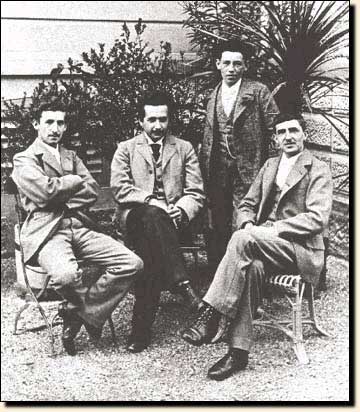 "Did God create all?", asked again the professor.
"Did God create all?", asked again the professor.
“Yes, Sir.” Answered the youth.
The professor answered: "If God created all, then God made evil, since evil exists, and under the precept that our works are the reflection of ourselves, then God is evil".
The student kept quiet before such answer, and the professor, happy, bragged to have proven, once again, that faith was a myth.
Another student raised his hand and said: "May I ask you a question, professor?"
"Of course", answered the professor. The youth stood up and asked: “Professor, Does cold exist? "What a question is that? Of course it exists, have you not had cold?"
The boy answered: "Of course, Sir, cold does not exist. According to Physics what we consider cold is in reality the absence of heat. Each body or object is susceptible of study when it has or it transmits energy, heat is what makes such body to have or to transmit energy. We have created such term to describe how we feel if we have not heat."
“And, does darkness exist?", continued the student.
The professor answered: "Of course!"
The student answered: "Again you’re wrong, Sir, darkness does not exist either, it is in reality the absence of light. Light can be studied, darkness cannot, even exists the Nichols’ prism to decompose white light into the various colors in which it is composed, with their different wavelengths. Darkness cannot. A simple ray of light tears darkness and illumines the surface where the light beam ends. How could I know how dark is a specific space? Based on the amount of light present in that space, is it not?. Darkness is a term that man has developed to describe what happens when there is not light present."
Finally the youngster asked the professor: "Sir, does evil exist?"
The professor answered: "Of course it exists, as I mentioned at the beginning, we see violations, crimes and violence all over the world, those things are of evil".
To which the student answered: "Evil does not exist, Sir, or at least it does not exist in itself. Evil is simply the absence of God, is, same as the previous cases, a term that man has created to describe the absence of God. God did not create evil. It is not as faith or love that exist as exist heat and light. Evil is the result of humanity not having God present in their hearts. It is as cold results when there is no heat, or darkness when there is no light."
Then the professor, after nodding, remained silent.
The young student was called"ALBERT EINSTEIN”.
Simply put: Cold is the absence of heat, darkness is the absence of light, hate is the absence of love, disbelieve is the absence of faith, pessimism is the absence of hope, evil is the absence of God. Only God exists who contains love, faith, hope, heat and light. Coldness, darkness, hate, disbelieve, pessimism, evil and all the negative qualities of the human nature do not exist, they are only relative terms to represent how much of what do exist is present. —Luis Prada
Back
![]()
How Highly Conscious Elephants Became Heroes During the Tsunami in Thailand of December 26, 2004
By Jim France![]()
![]()
![]()






From the unbelievable chaos of the Tsunami disaster comes an incredible tale from Jim France of the Pavilion Hotel Group in Bangkok.
At a resort on Phuket, one of the most popular attractions is (was) elephant rides. As many as eight people on one elephant, first into the surrounding forest, then down to the beach to lunch at a fresh water lagoon, then back to the hotel. The elephants (nine) were kept chained to in-ground posts, not because they needed to be, but because it made the mothers feel better because their children seemed safe from a tromping when feeding the beasts.
About twenty minutes before the first wave hit, the elephants became extremely agitated and unruly. Four had just returned from a trip and their handler’s had not yet chained them. They helped the other five tear free from their chains. They all then climbed a hill and started bellowing. Many people followed them up the hill. Then the waves hit. After the waves subsided, the elephants charged down from the hill, and started picking up children with their trunks and running them back up the hill; when all the children were taken care of, they started helping the adults.
They rescued forty- two people. Then, they returned to the beach and carried up four dead bodies, one of a child. Not until the task was done would they allow their handler’s to mount them. Then with handlers atop, they began moving wreckage.
Many Super-Human and Super-Sentient capacities were being exhibited through these Wonderful Elephant Beings including Divine Love for one another and their fellow humans through the transitions they were going through.
For me, this is another sign that we will eventually awaken to recognizing the animals as our companions and conscious co-creators of life on earth, instead of beasts of burden, food and clothing.
Back
![]()
Unknown Author
(Original text in Spanish, translation.)
There was an Indian town near the main route of merchants and travelers. Many people passed through the locality. But the people had become well-known by a unusual happening: there was a man who was uninterruptedly asleep for over a quarter of a century. Nobody knew the reason. What a strange event! People who passed through town always stopped by to observe the sleeping one. "But, what is causing this phenomenon?" —the visitors wondered.
Nearby this place there was a hermit. He was an unsociable man, who spent the day in deep contemplation and did not want to be disturbed. But he had acquired fame of knowing to read others´ thoughts. The mayor himself came to visit him and pleaded him to go to see the sleeper just in case he was able to know the cause of such a long and deep sleep. The hermit was a very noble man and, although his apparent sternness, he offered himself to collaborate in the clearing up of the fact.
He went to town and sat before the sleeper. He concentrated deeply and started to drive his mind to the clairvoyant regions of consciousness. He introduced his mental energy into the brain of the sleeper and connected to him. Minutes later the hermit came back to his ordinary state of consciousness. All the town had gathered to listen to him. With paused voice he explained:
–Friends, I have arrived, yes, to the central cavity of the brain of this man that has been sleeping for over a quarter of a century. Also I have penetrated in the tabernacle of his heart. I have searched for the cause. And, for your satisfaction, I must tell you that I have found it. This man dreams continuously that he is awaken and, therefore, he is not willing to wake up.
Back
![]()
Unknown Author
(Original text in Spanish, translation.)
History tells that once upon a time there was a fourth Magus King who came late to the appointment with the other Three Magi for helping an old man. By his own means he traveled to Bethlehem, but the Holy Family had left for Egypt, where he tried to search for them unsuccessfully, always entangling himself in helping someone in need.
Returned to their original place the Three Magi told him about Child Jesus and in his heart he promised to find him.
 When after 30 years he heard of the prophet of Galilee, he wanted to see him. Unfortunately the right time never came for fixing the miseries he was finding on his path.
When after 30 years he heard of the prophet of Galilee, he wanted to see him. Unfortunately the right time never came for fixing the miseries he was finding on his path.
At last, already an old man, he caught up with Jesus climbing for Golgotha and he told him: "All my life I have search for you without being able to find you".
Jesus answered: "You did not need to look for me because you were always by my side".
Matthew 25:40 "And the King shall answer and say unto them, Verily I say unto you, Inasmuch as ye have done it unto one of the least of these my brethren, ye have done it unto me."
Back
![]()
Unknown Author
(Original text in Spanish, translation.)
Once upon a time there was a very pious woman who without failing came every morning to pray at her neighborhood’s chapel . Day in and day out, rain or shine, sick or healthy, happening what may, as a clock, at seven sharp in the morning she was the first person to arrive at the chapel, push the door and enter to pray.
One morning he woke up startled. She overslept! It was ten to seven and she could not arrive on time to her daily appointment! At full rush she got up, combed her hair in a hurry and dressed herself as she could. With her clothes half wrinkled and her hair half done she swiftly left home and headed for the chapel. As she had just left, she almost stumbled with an old man that barely came riding a bike, and when crossing by her he lost control of the vehicle and fell face down on the floor. Regrettably the woman was so much in a hurry as to stop so she could barely give a hint of an apology and continued her rush.
A block later she was crossed by a woman who asked for help to be able to pay for a medical appointment at the hospital. "Pardon me, I’m in a hurry" barely she said without stopping and continued her fast pace. Once she had managed to get rid of the woman she was crossed by a child who asked her for some bread. "Excuse me, little son, but I have an appointment with God and cannot be late. Some other time", and she continue her uninterrupted walk.
At last when she arrived at the chapel she looked at the watch out of the corner of her eye. It was seven o’clock! She made it!! Overwhelmed with emotion by having not failed the appointment, she pushed the chapel’s door as customary, but… it did not open. She pushed again with stronger force, and nothing. How weird! Never in the twelve years she was following her daily routine she had found the door closed. Suddenly she noticed a note nailed down with a thumb tack on the chapel’s door. Confused, she unnailed it and read it. The note, scribbled as with rushing, said:
"Pardon me for not being here. This morning I had an accident in my bicycle, and on top of that, later I could not get money to go to the hospital, nor some bread to have breakfast, so it is likely I arrive a little late. Signed: God".
Back
![]()
End of Fables and Tales, Book One
I hope you have enjoyed reading these wonderful collection. On behalf of Brother Veritus’ Website I express my deep longings that this collection would have been enlightening and that it had contributed to your spiritual development. A second book is underway. God Bless You, Dear Hearts.








Leave a Reply